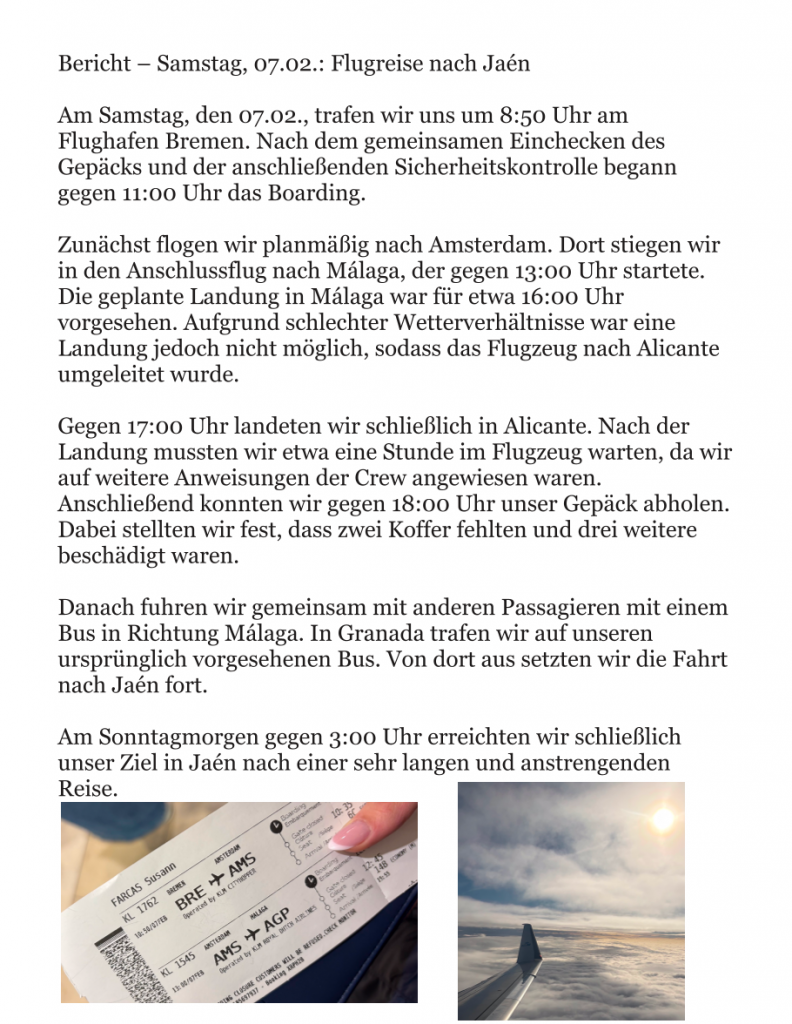
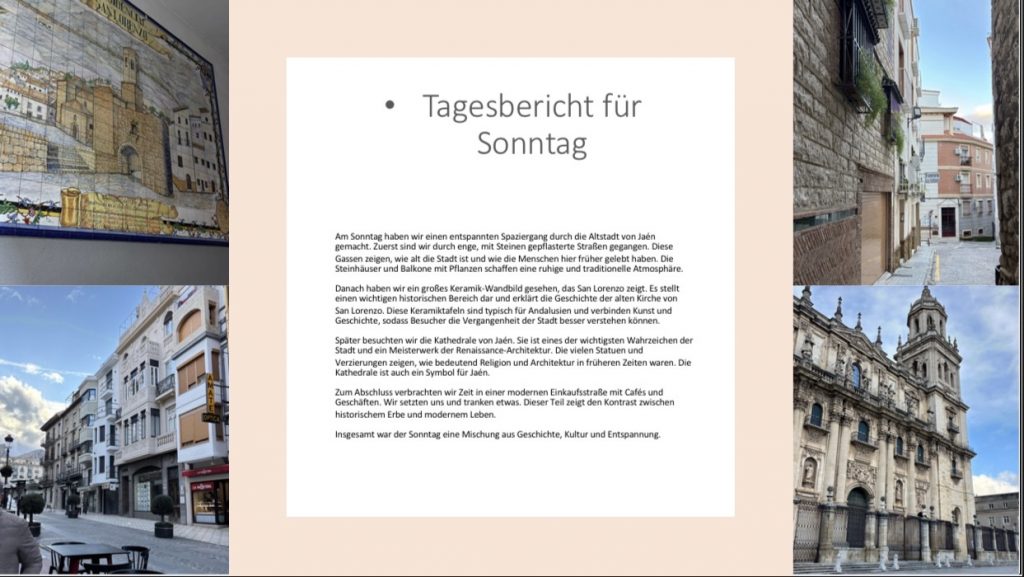
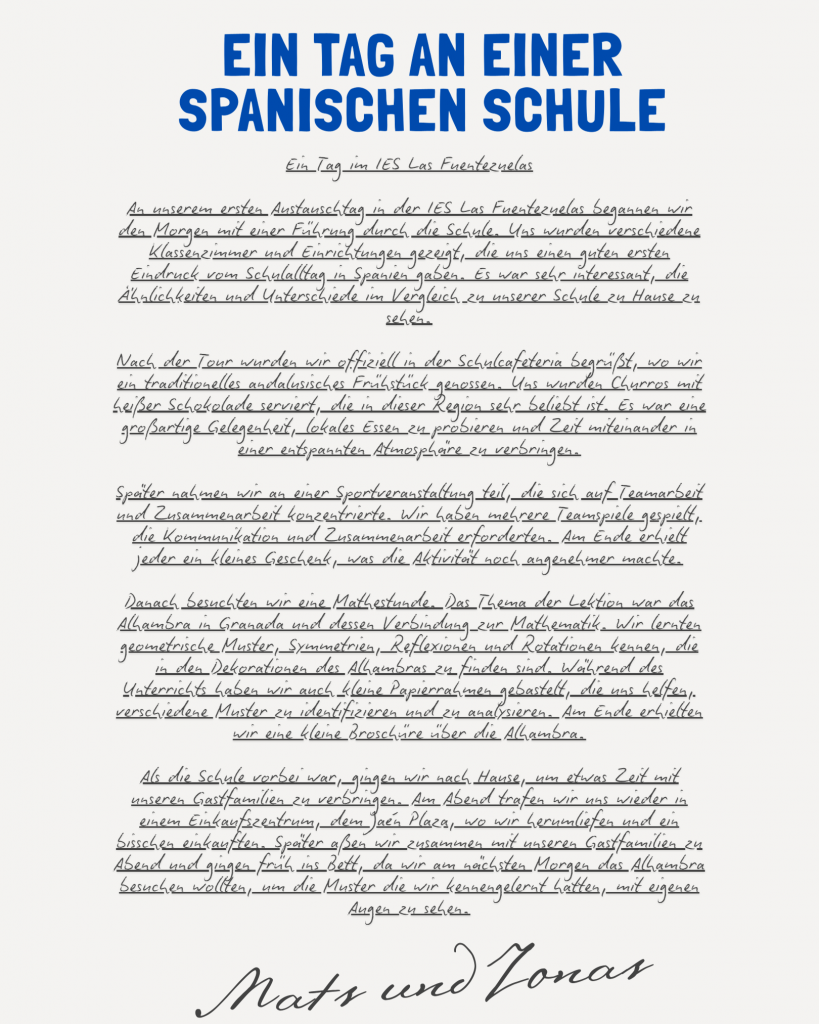
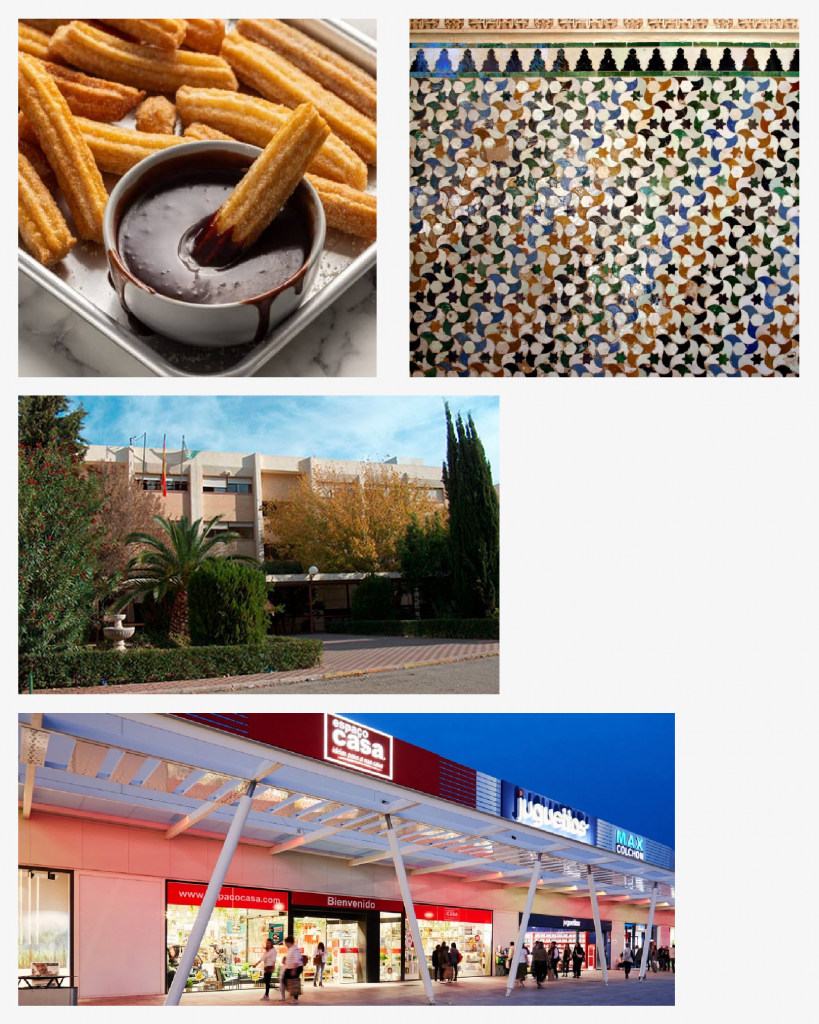
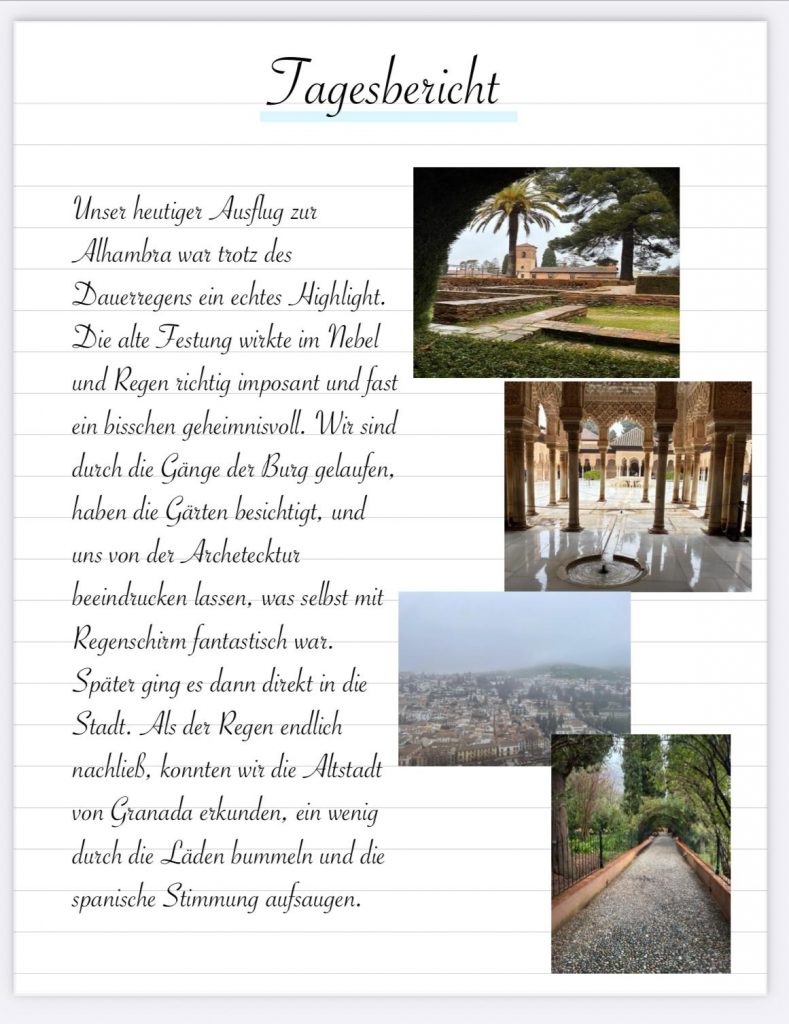
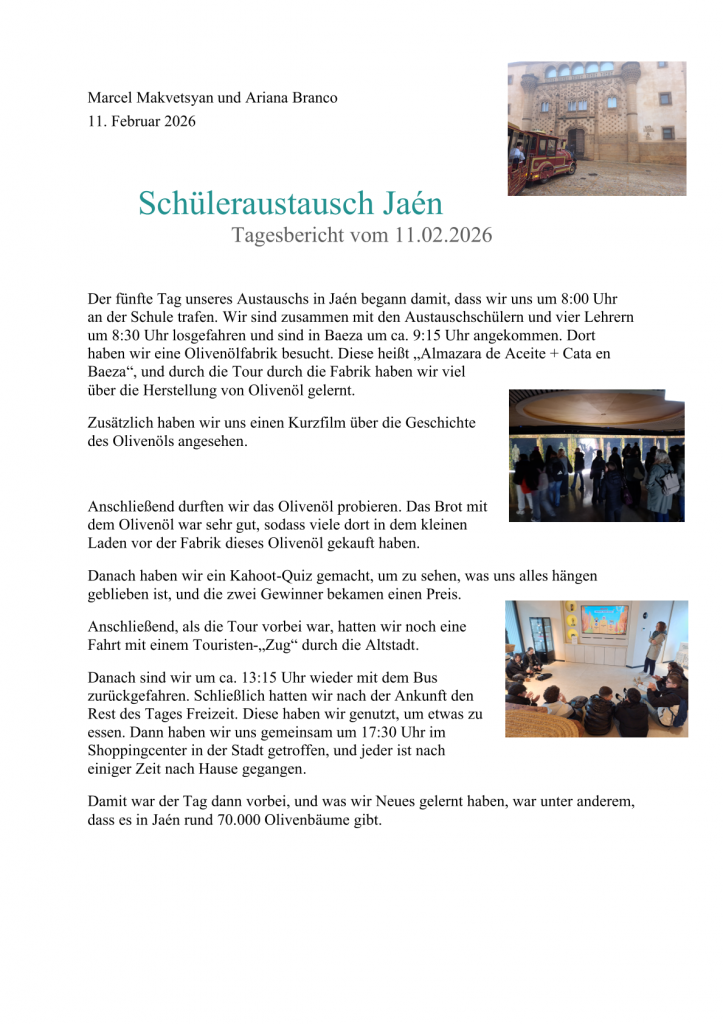
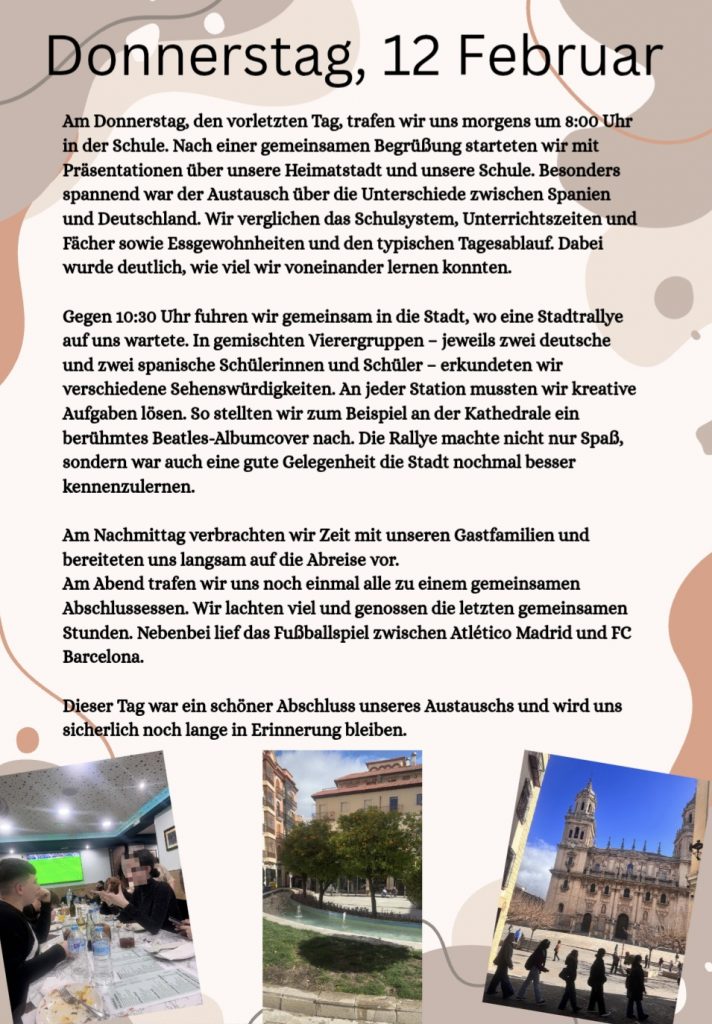







Vom 20.11.25 bis zum 23.11.25 nahm Frau Bliek als Vertreterin des Lloyd Gymnasiums am Kontaktseminar der UK-German Connection in Teltow bei Berlin teil. Ziel der Veranstaltung war die Anbahnung einer Schulpartnerschaft mit einer britischen Schule und die initiale Planung eines gemeinsamen Projektes.
Zunächst stellten sich die 17 teilnehmenden britischen und die 17 deutschen Schulen vor. Es war sehr spannend, einen Einblick in die verschiedenen Konzepte der Schulen zu erhalten.

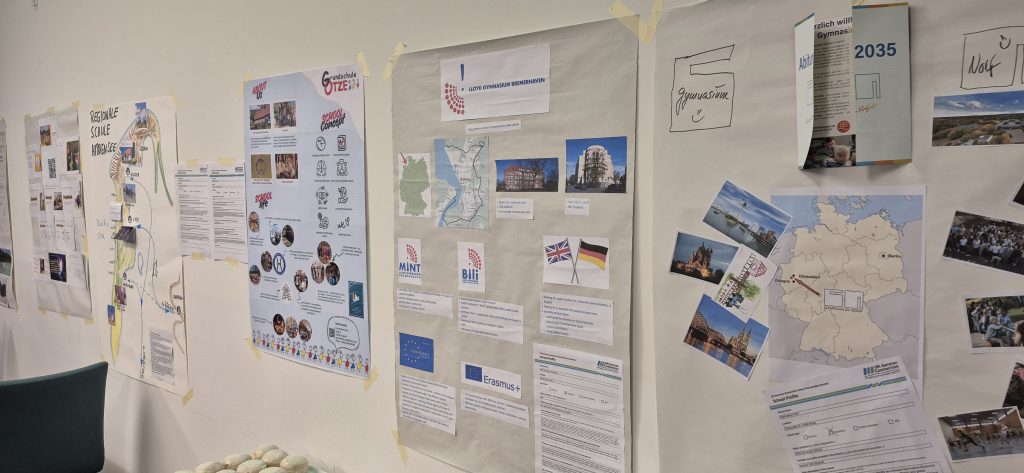
Bereits am ersten Abend lernten sich die Vertreter:innen der Partnerschule kennen, um die nächsten Tage für die gemeinsame Planung nutzen zu können. Wir freuen uns, dass wir mit der Bellahouston Academy in Glasgow, Schottland eine neue Partnerschule für das Lloyd Gymnasium gefunden haben!
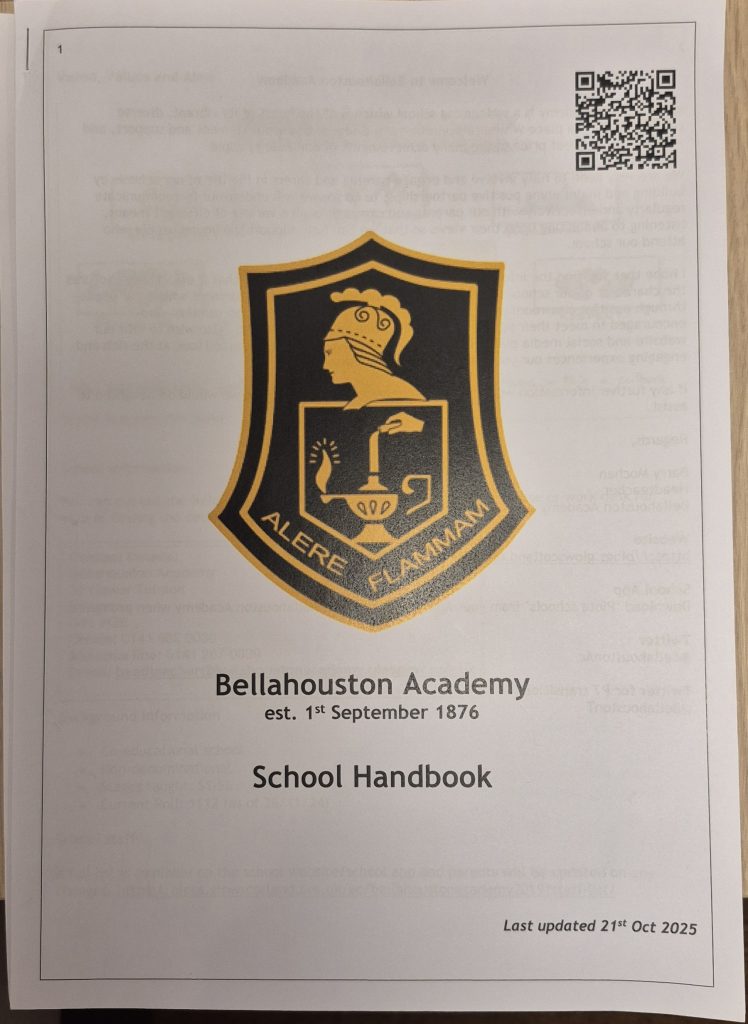
Der Freitagmorgen begann früh mit einem Besuch des Dalton Gymnasiums in Potsdam. Wir erhielten einen Einblick in die Dalton-Zeit und weitere Unterrichtsstunden und konnten interessante Gespräche mit dem Kollegium führen.
Danach wurden wir in verschiedenen Informationsveranstaltungen auf die Planung eines gemeinsamen projektgeleiteten Austausches vorbereitet und erhielten Zeit, ein konkretes Projekt für unsere beiden Schulen zu planen. Aktuell bereiten wir einen Austausch mit politischem Fokus für Jahrgang 9 vor und planen, noch in diesem Schuljahr erstmalig unsere Partnerschule in Glasgow zu besuchen, um gemeinsam an diesem Projekt zu arbeiten!
Neben der Projektplanung durfte auch ein Besuch in Berlin nicht fehlen. So besuchten wir u. a. gemeinsam das Reichtagsgebäude.
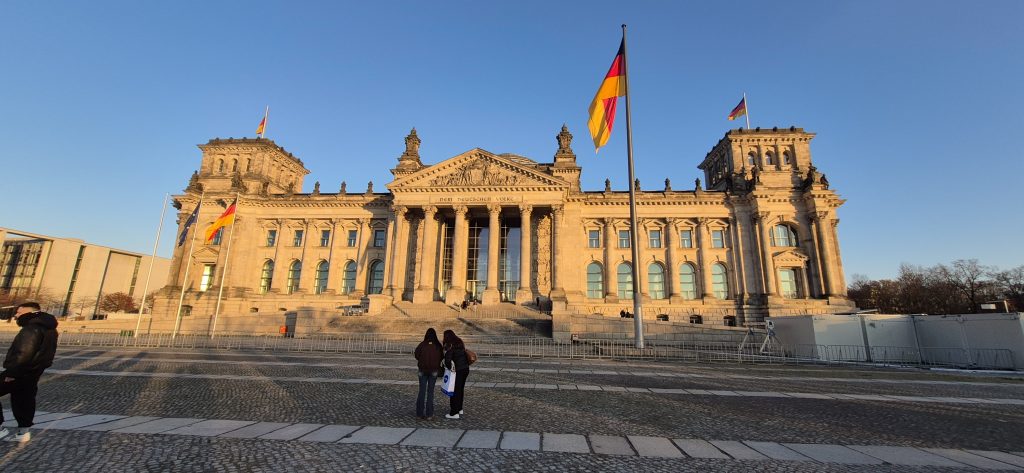
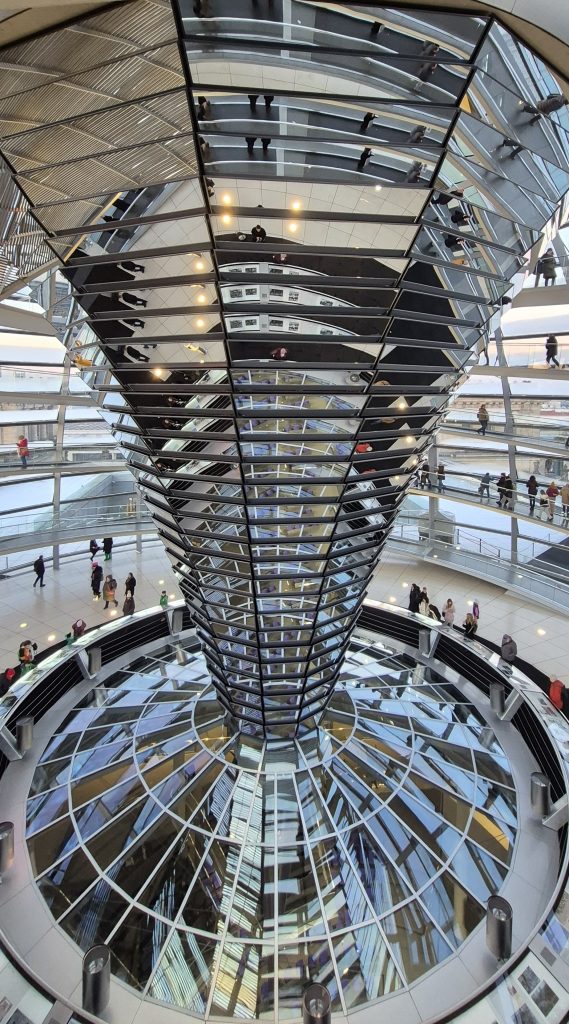
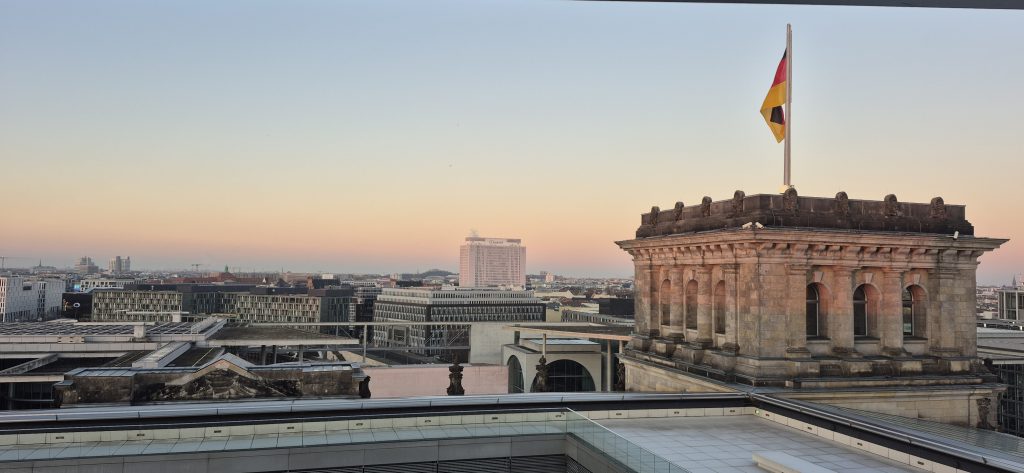
Insgesamt bot die Veranstaltung eine großartige Möglichkeit, sich nicht nur mit seiner Partnerschule, sondern mit vielen verschiedenen Vertreter:innen britischer und deutscher Schulen auszutauschen. Das Lloyd Gymnasium ist dankbar, dass wir an dieser Veranstaltung teilnehmen durften und freut sich auf eine langjährige Zusammenarbeit mit der Bellahouston Academy!
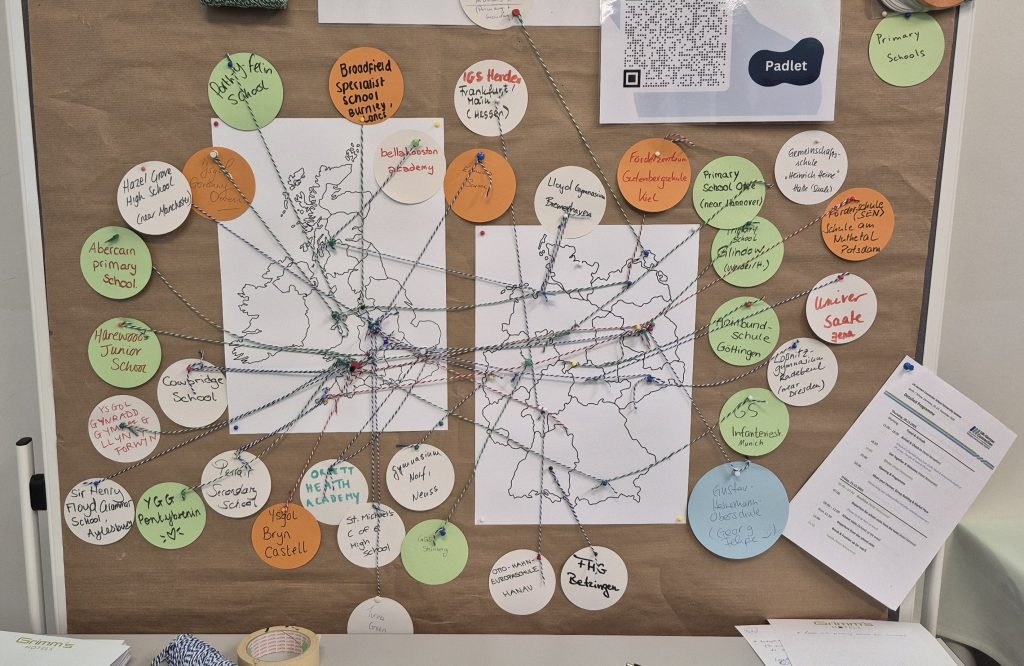
Die Veranstaltung wurde (u.a.) aus Mitteln des Auswärtigen Amts gefördert und durch UK-German Connection unterstützt. Die Logos wurden von der UK-German Connection zur Nutzung auf der Schulhomepage zur Verfügung gestellt.


Am 27.11.25 fand zeitgleich in allen EU-Staaten der Übersetzungswettbewerb „Juvenes Translatores“ statt. Das Lloyd wurde durch zwei Schülerinnen aus der Q1, Samanta Šarkanj und Jana Sabiai, vertreten. Bei dem Wettbewerb geht es darum, einen vorgegebenen Text von einer selbst gewählten EU-Sprache in eine andere selbst gewählte EU-Sprache zu übersetzen. Verwendet werden durfte ein Wörterbuch, die Nutzung von KI war jedoch ausgeschlossen. Jana hat aus dem Deutschen ins Englische übersetzt, während sich Samanta entschieden hat, aus dem Deutschen in ihre Muttersprache Kroatisch zu übersetzen. Den beiden Schülerinnen hat der Einblick ins Übersetzen gefallen. Nun warten wir gespannt auf die Ergebnisse.
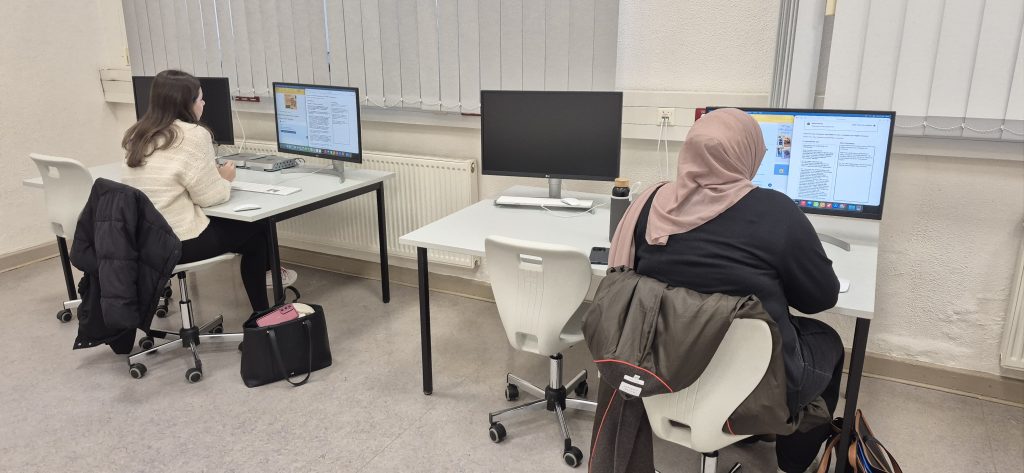
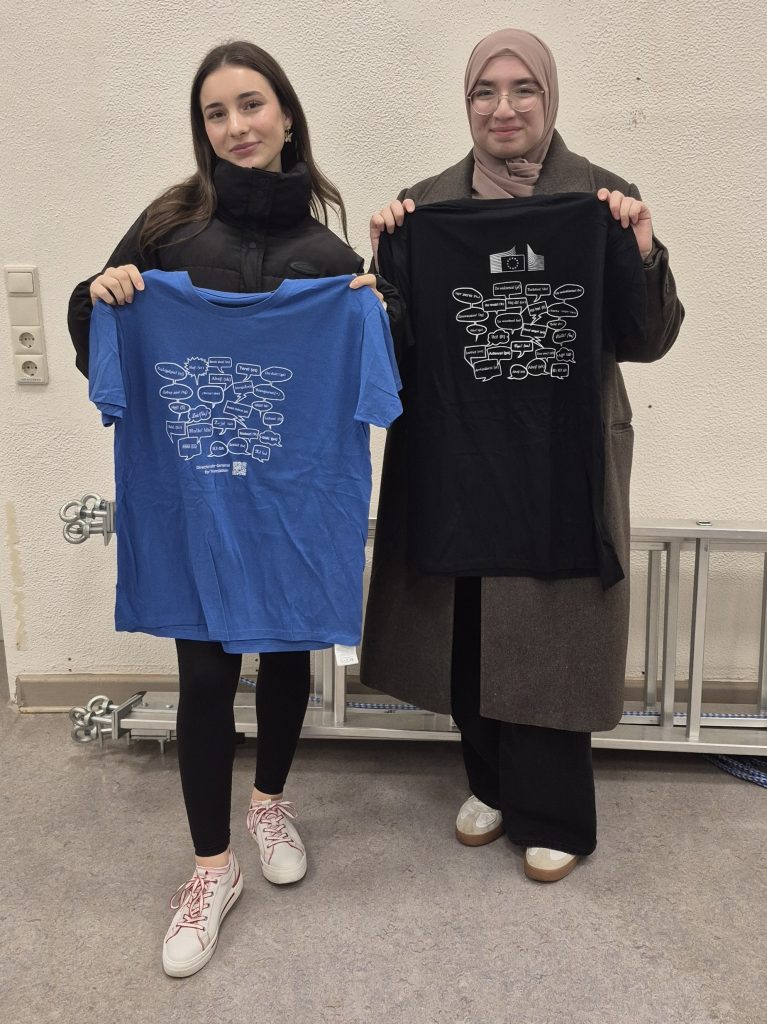
Today we arrived in Poland with our German exchange group.

First we went by train to Hamburg. At the airport we had to wait for a long time, and everyone was really excited and couldn’t wait for the week to start. The flight went pretty well. After we got our luggage, the Polish students were already waiting for us with homemade signs. The signs had our names on them and on the back there was another message. After we met the students it was already time to go to our host families.

My host family was super nice and they made a really nice dinner. After dinner my host sister and I had to bake something for the next day. The first day was really exhausting and I was happy to finally go to bed, but I can already tell that the exchange is going to be a great experience.
Today was our first day in Gdansk. We were divided into groups of 4-5 people to go on a rallye to see the sights of Oliwa. It was a fun activity and we for example climbed an observation tower and saw the whole city. After we finished the rallye we went back to one of the places we did visit before, it was the Oliwska cathedral, to listen to an organ concert. This organ was very special, because some decoration parts were able to move. For example stars were spinning. Later there were integration games and we even learned a Polish dance. For lunch we had a buffet of self made Polish food. In the afternoon each student had free time to spend with his our her host family. It was a nice day to start the trip.
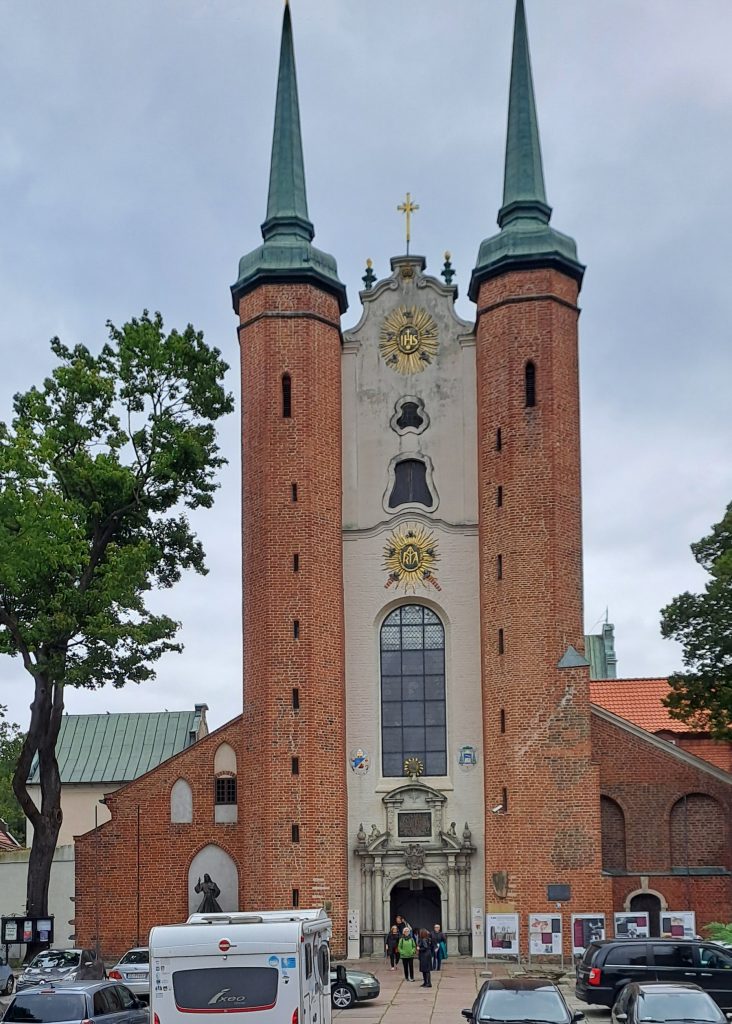
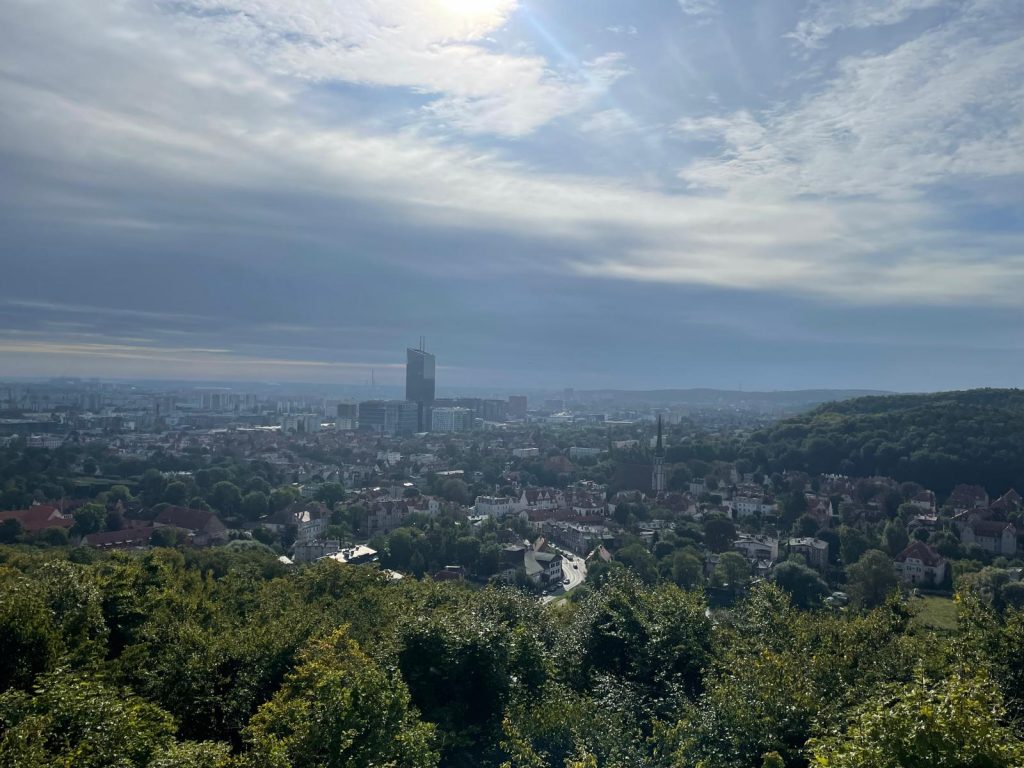
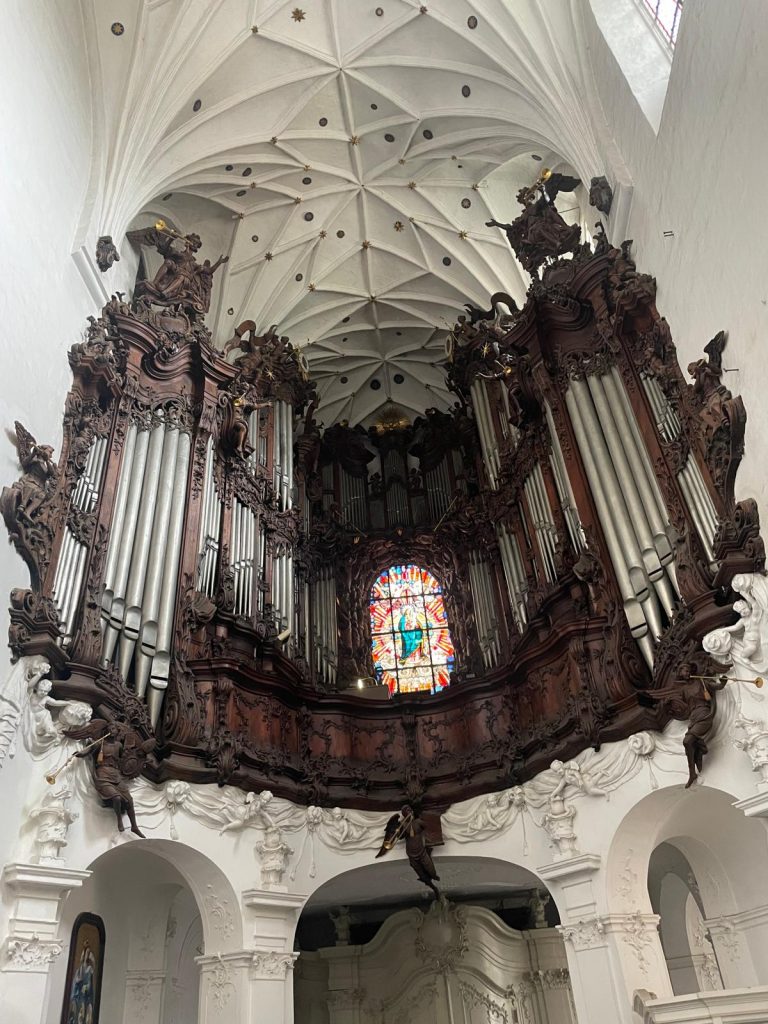
Today was the third day of our exchange to Danzig! We Met at the school and went to a nearby trainstation! From there, we went around 1 hour to Malbrok. There we walked to the castle! The Malbrok Castle is the biggest stone castle in the world and you could not say any different! We went inside in small groups of 5 or 6 and had an audio guide and also some questions we needed to answer at the trip! We saw so many rooms for different occasions and also very interesting exibishions.
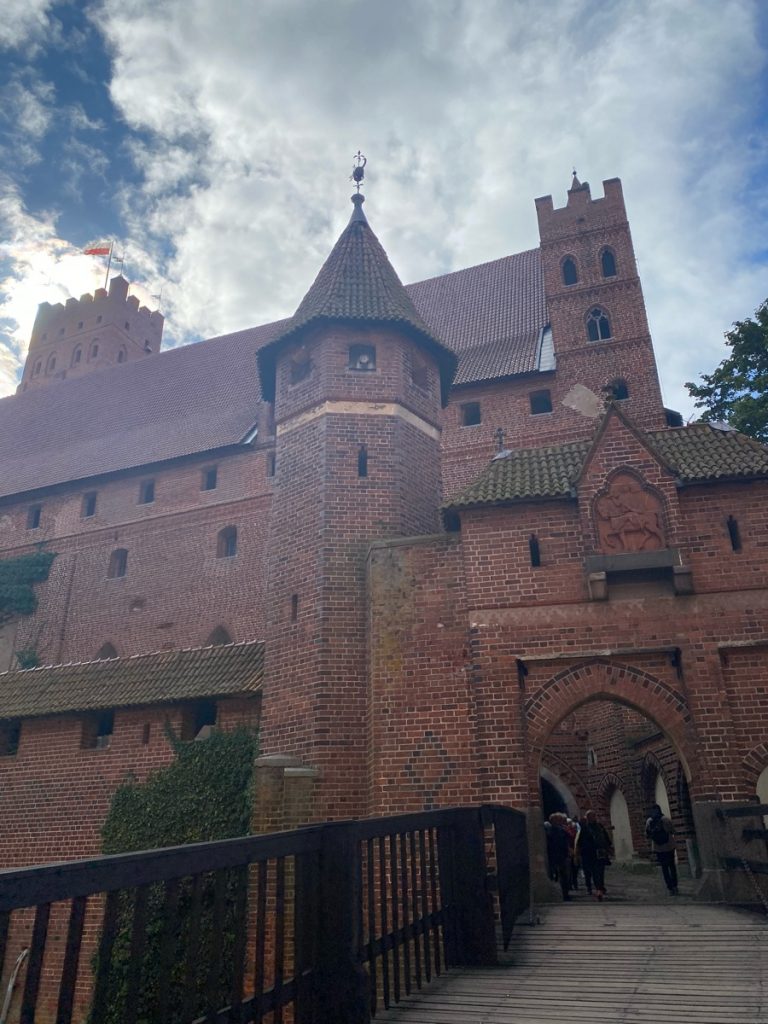
When we finished the tour we met again and drove back to Danzig! When we arrived it was time to go back in the families so some of us went to a restaurant to eat piroggi which is a typical polish food! It was delicious. When we finished, we went to a nearby city and a mole. We learned about a typical polish sweet and saw a sunset. Then we went on the mole and took stunning pictures of it! When we went back home, we were all exhausted but happy from the day! There is still so much to see at Danzig!
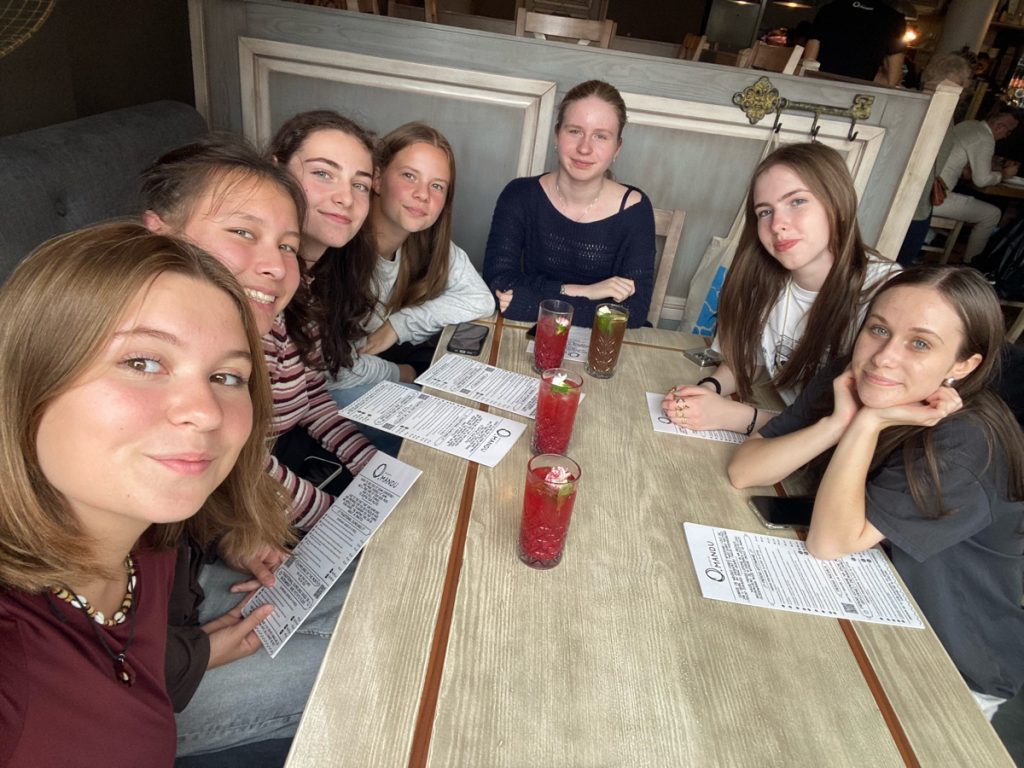
Today we met up with our whole exchange group in the Gdańsk Old Town for a guided tour with our guide Magdalena Kosko. The Polish students already knew the Old Town and its history, so most of them went elsewhere.
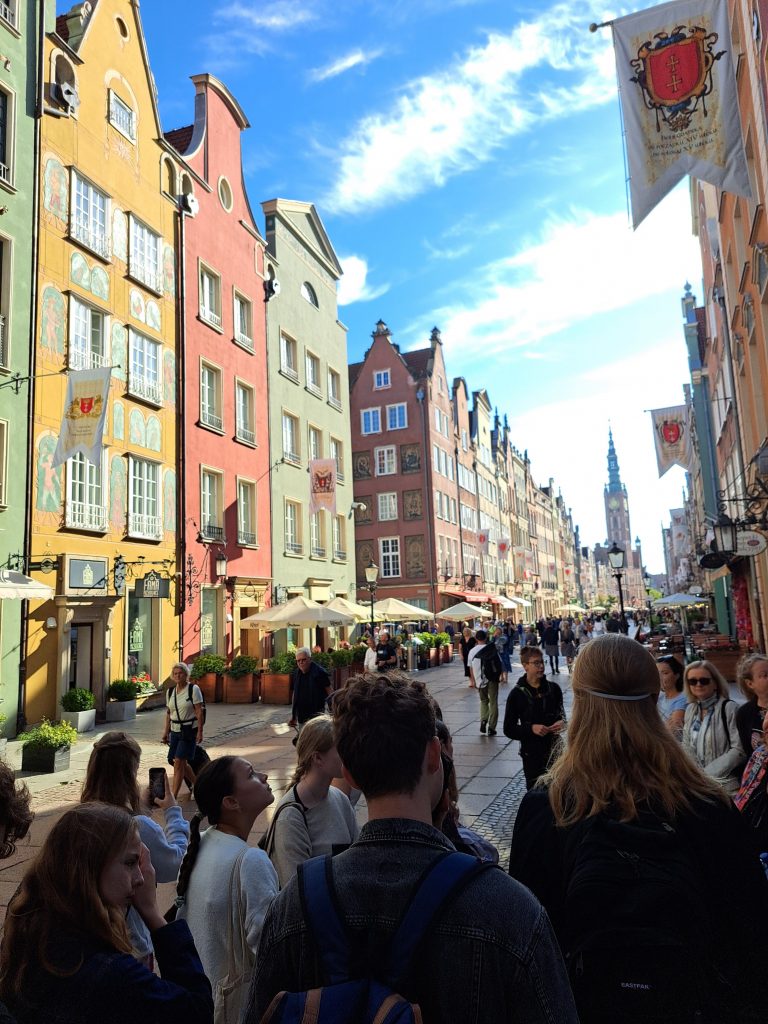
We started our tour at the Golden Gate, where we quickly noticed that our guide had a great sense of humor. She led us past various sights such as the Town Hall, Neptune’s Fountain, and several places along the river. Our final stop was St. Mary’s Church (Mariacki), where we saw the impressive 14-meter-tall astronomical clock in action.
After the presentation, we said goodbye to our tour guide and headed to our next destination, this time joined by most of our exchange partners: the Museum of the Second World War. There, we once again used audio guides to navigate the exhibitions and learned many details about the war and its connection to Gdańsk.
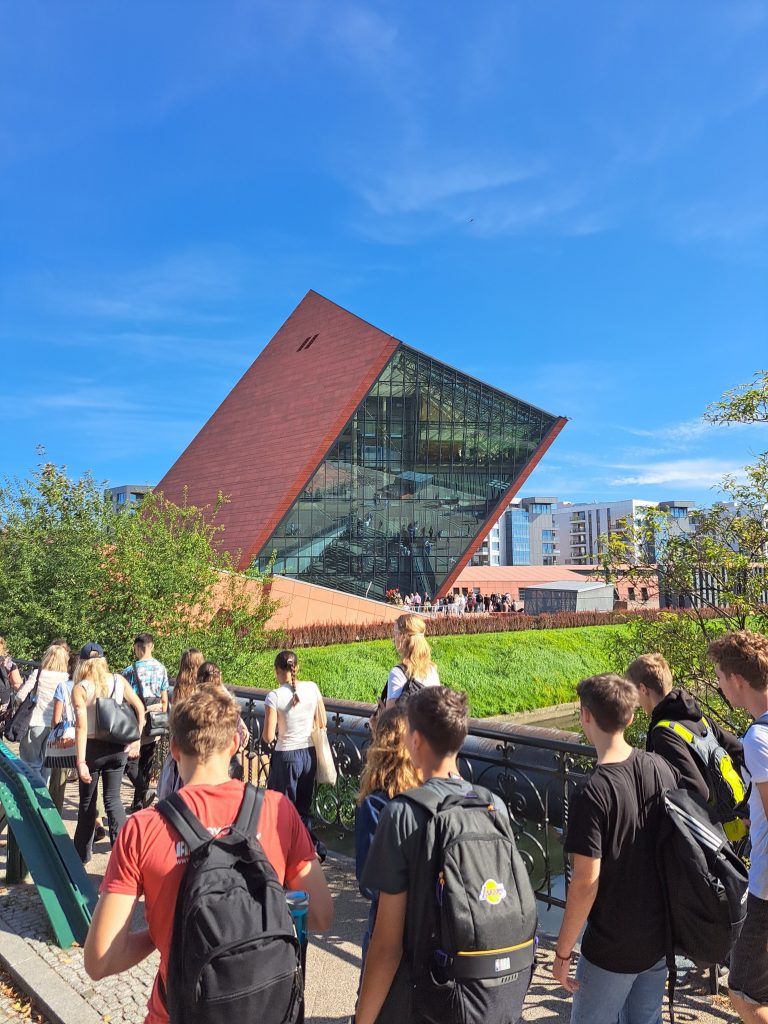
After our visit, some of us were picked up, while others went shopping, and a few even attended a concert by the famous Polish singer-songwriter Dawid Kwiatkowski at the FORUM shopping mall.
In the end, it was a very long and exhausting day, and we all went home to recharge our energy for the days ahead.
This Sunday we started the day by going to an escape game. I’ve never participated in one before, so it was really interesting to experience it for the first time. After having solved fun puzzles and escaping the scientists laboratory we went to a café, where we ate some delicious cheesecake and played cards and board games to pass time.
In the evening we had some traditional Polish food called pierogi and afterwards we went to the brzeźno beach where we saw the sunset. Overall it was a great day containing fun activities.
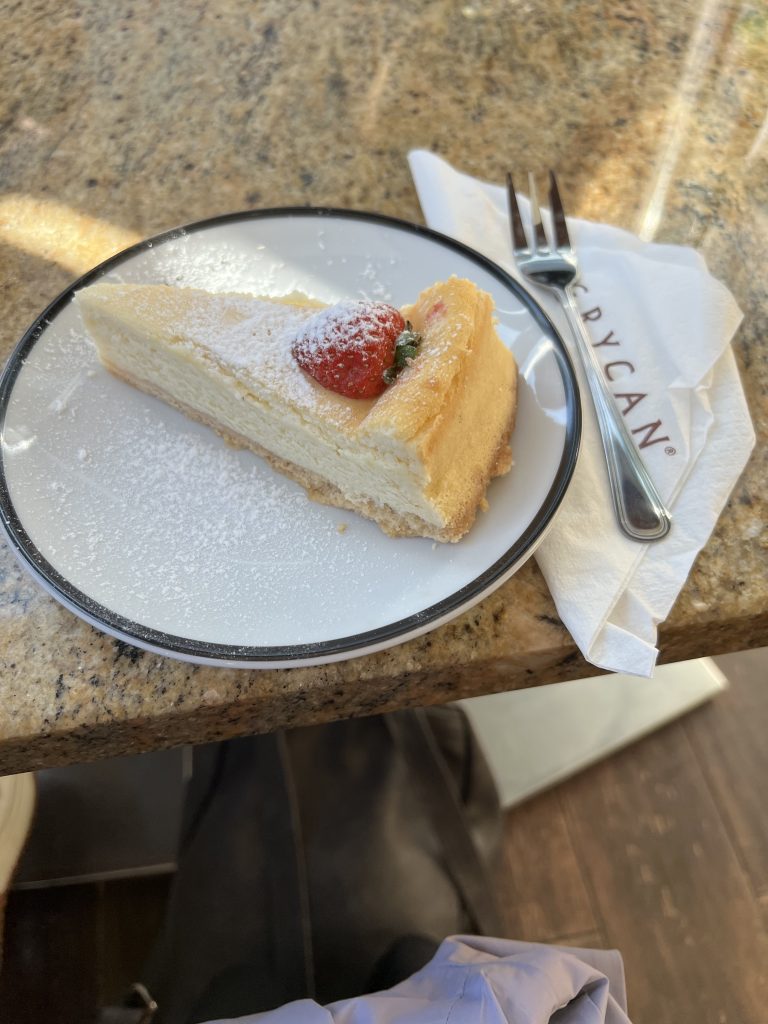
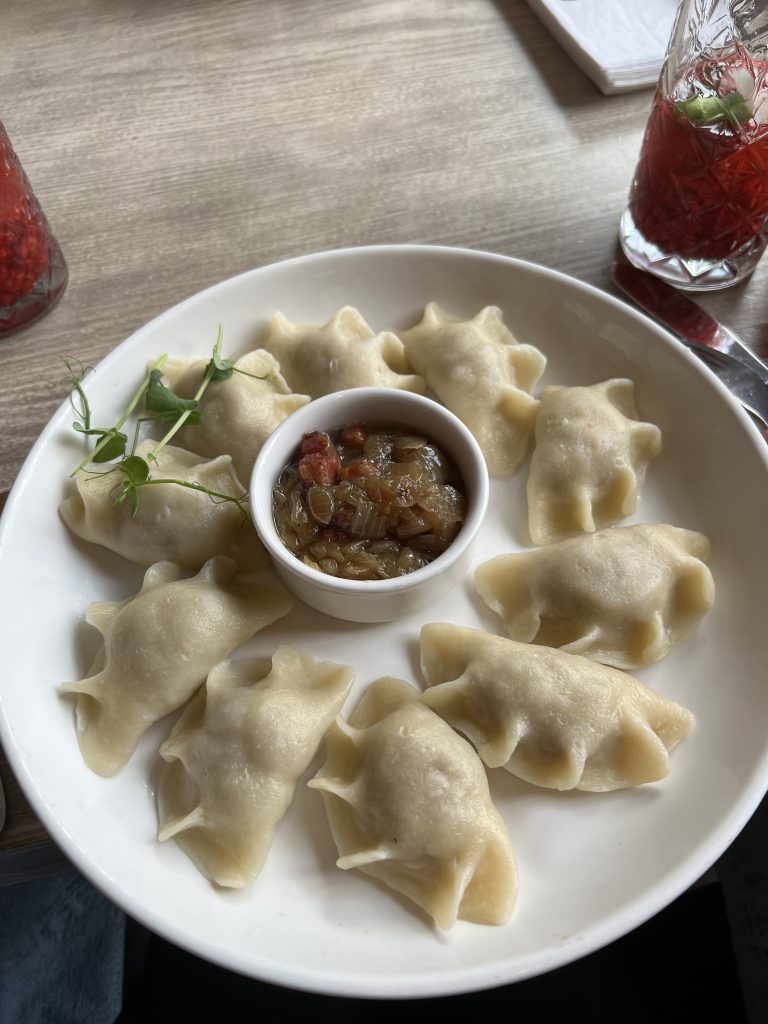
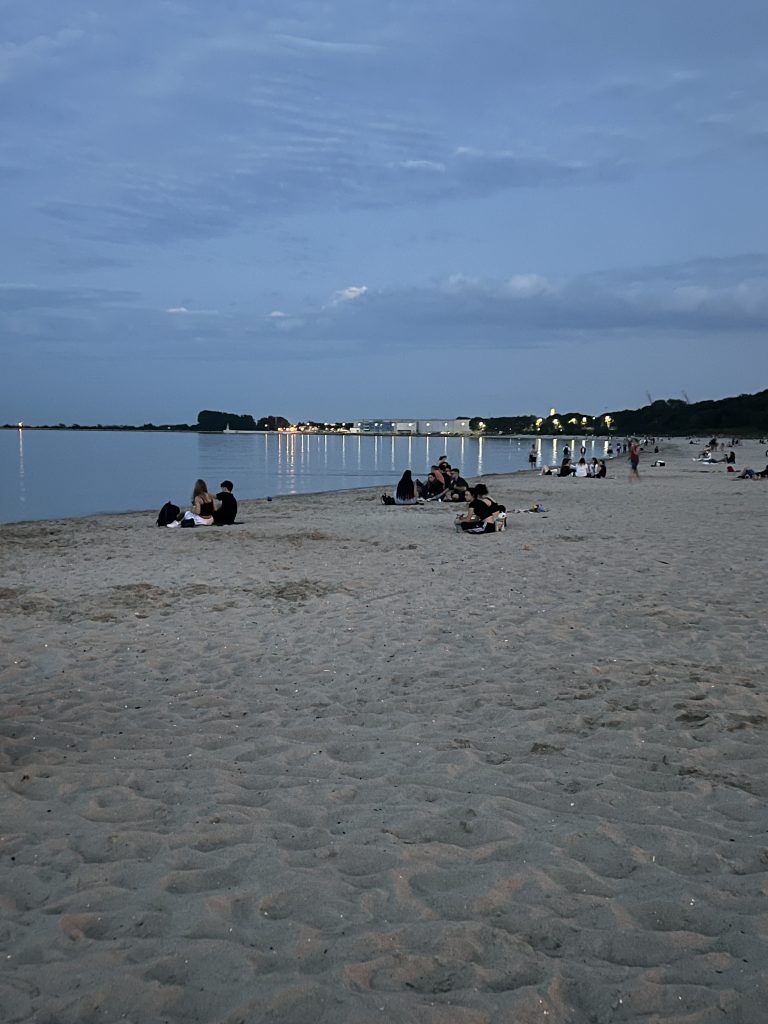
We woke up at nearly 8am, and we`ve eaten breakfast together. After breakfast we had to meet our friends at a shopping mall, to go to a escape room together. It was a gameplay set in the victorian era in England. It was for our entire group a great experience to be in a escape room like that, especially because it was in a unique setting, while being one of the hardest rooms the local offered.
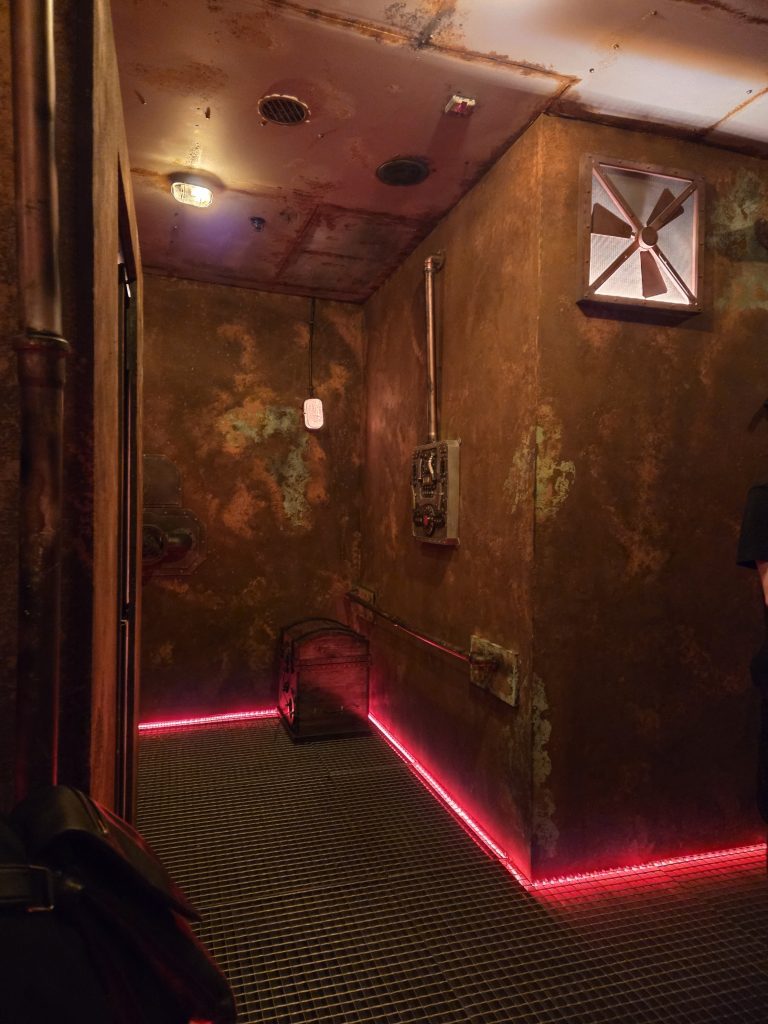
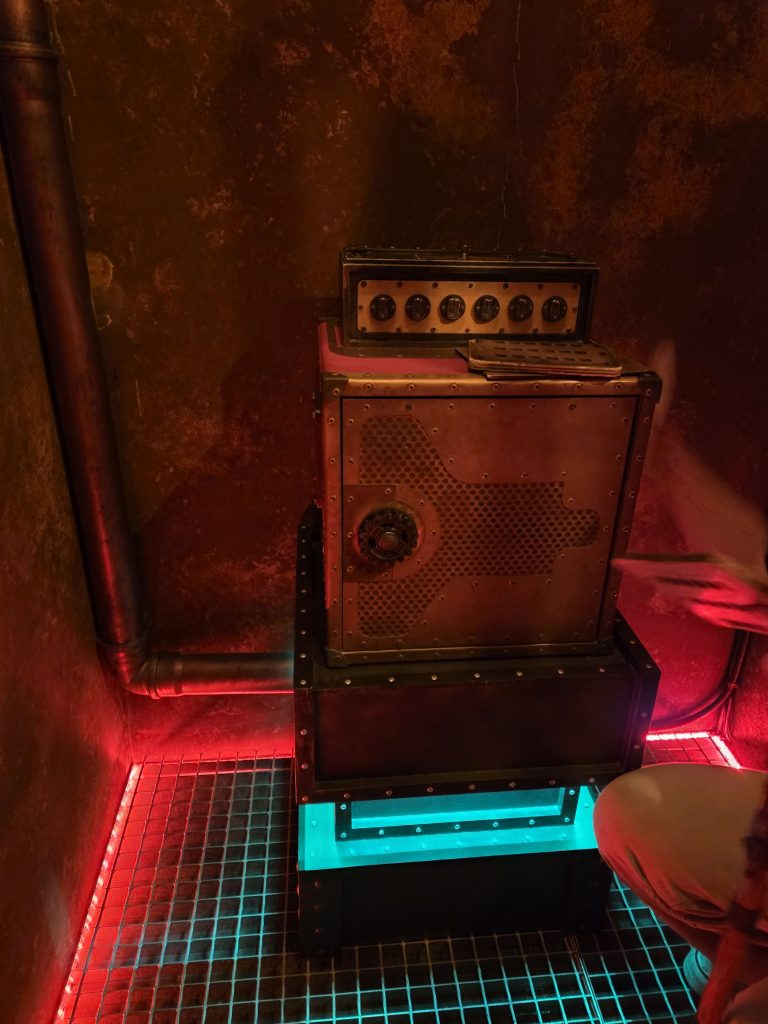
After that, we went to another mall, and while we were waiting for a cafe to open, we went for a ride in a minion styled vehicle for kids, and the staff member from the mall told us to get out and be more responsible for a couple of grown people 🙁 (but we still had our fun).
When the cafe finally opened, we met up with another friend and went in to eat some desserts and play board games. We were sitting there and chatting for nearly three hours, and then we went to the main station SKM and headed to Puck. After some miscommunication with other people from the exchange, we`ve decided to drive in the group of us, Irenka and Iulia back to Gdansk and found a cozy Pierogarnia place. When we finished our meal we went to the Brzezno beach. It was already getting dark, but it was a magnificent experience to hang out at the beach and play cards this late. All in all, we were happy about the fact, that we spend our day together and had a splendid time. 🙂
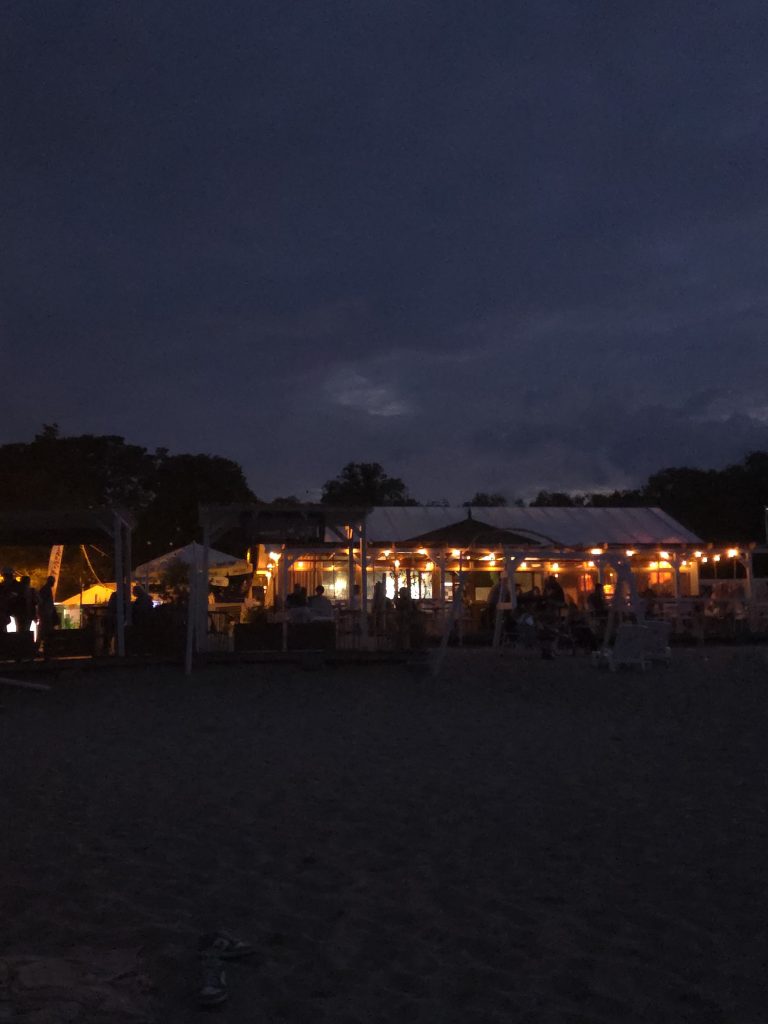
A Perfect Family Sunday in Gdańsk
Our Sunday in Gdańsk was a day full of fun and relaxation. It started a little late, around 11 a.m., with a delicious breakfast that got us ready for the day.
Afterwards, our my exchange partner and me headed straight for the aquapark close to Gdańsk. It was a special day because we met up with many other exchange students there, turning it into a big funny group. The aquapark was the perfect place for everyone to have a good time. We spent most of the day there, enjoying the different pools, slides, and water attractions.
When we were tired from all the swimming, we decided to grab some pizza together right there at the park. It was the perfect meal to refuel and relax after such an active day.
As the evening approached, we drove back home to rest for a bit. But the day wasn’t over yet! For a final bit of fun, my exchange partner and my went to McDonald’s to try the difference between the Polish and German version. It was a great to see the difference of the food and a great way to end our evening together before heading home.
By the time we got back, the sun had already set, and it was a perfect end to an unforgettable day.
The day started at 8:15 a m when we met at the school and waited for our bus. While we were waiting, we took a nice group photo and enjoyed talking together. The bus came around 9:00 am and we left for the Stutthof concentration camp, arriving there about an hour later.
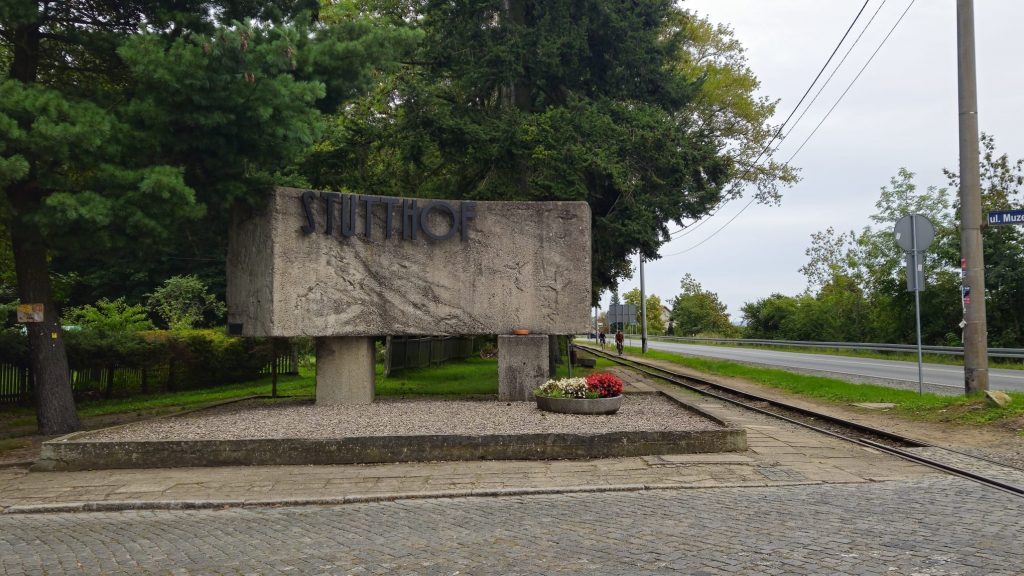
After a short break, we went to a hall for a workshop, where we talked about different parts of the Nazi time and life in the camps for about 45 minutes. After that, we took a guided walk around the site, looking at the historical area and learning more about its history.
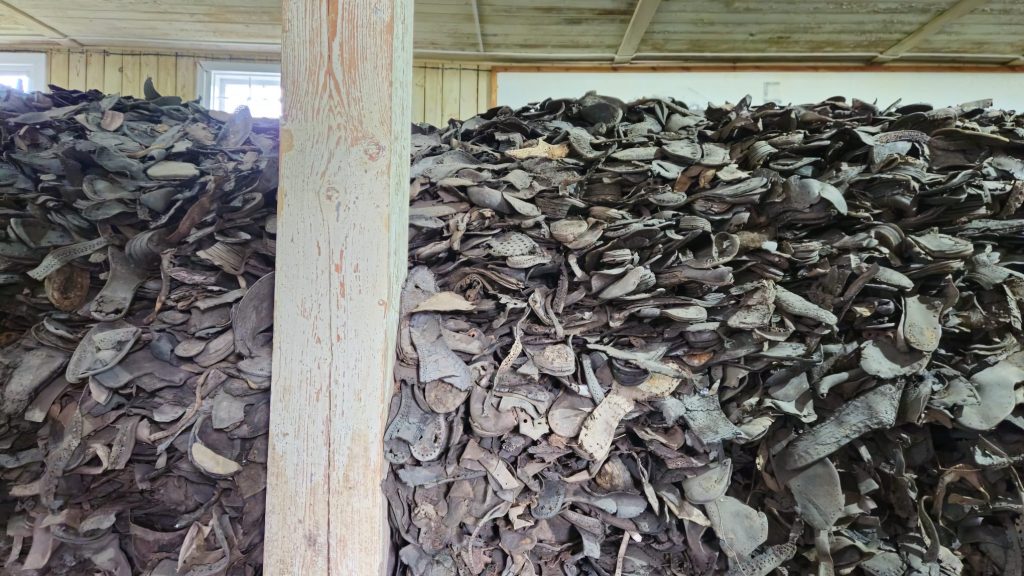
In the end we met again for a short discussion to share our thoughts and feelings. We were all agreed that what happened there was very touching and truly awful and must never be forgotten. The visit was both emotional and informative, giving us important insight into this dark part of history.
Today was already the sixth and last day of our exchange in Gdańsk.
In the morning, we met at school at 8:45 and left by bus at 9:00. The ride took about 1 hour and 25 minutes. There was a bit of traffic, but it was okay.
We arrived in Łeba around 10:25. The weather was not so nice at first – it was windy, rainy, and about 16°C. At 10:40, we took three electric shuttle cars to the dunes. On the way, it started to rain and even hail a little bit. Luckily, when we arrived and started to climb the dunes, the weather became better. It was sunnier and also a bit warmer.
We climbed up the dunes and had a lot of fun there. Some of us jumped or rolled down the dunes, which was very fun.
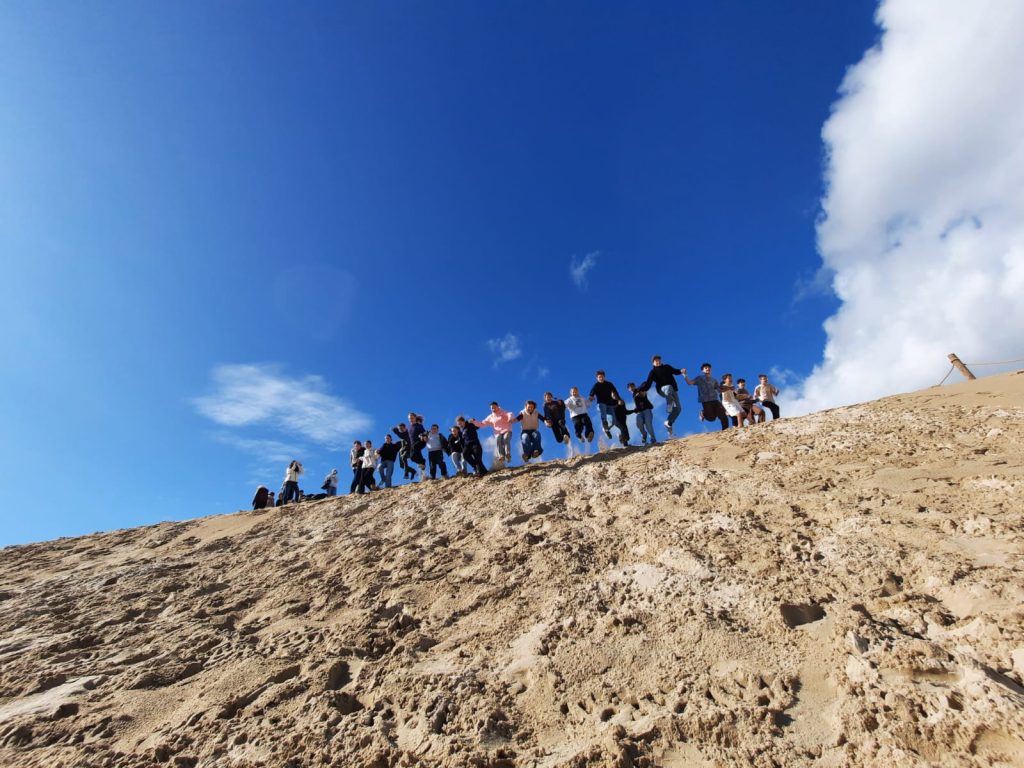
After that, we walked down to the beach. We had a small picnic, and some of us put our feet into the water, even though it was really cold. The sky was cloudy again, but the atmosphere was very nice.
Then it started to rain heavily, and we continued walking along the beach for about 40 minutes until we reached an old rocket launch site. Some students even walked barefoot through the wet sand.
After the long walk, we took the electric shuttles back to the parking lot. Before going home, we also climbed up a viewing tower. From the top, we could see the sea, the forest, and a little bit of the dunes. The weather was changing all the time – sometimes sun, sometimes clouds. We even saw a rainbow!
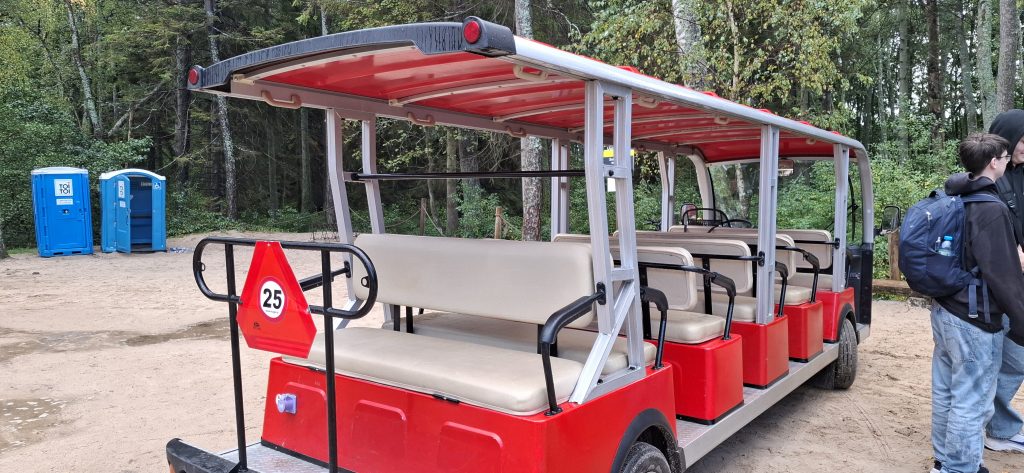
At around 14:00, we left Łeba and went back to Gdańsk by bus. Some students got off earlier because it was closer to their host families. The rest of us arrived at the school around 15:40.
In the evening, everyone spent time with their host families, enjoyed the last moments of this amazing week, and packed their suitcases for the journey home.
The day of departure
At some point of the day leaving had to come, because even the best time ends one day. The plan was to meet at 9:00 at the airport, flight at 12:20 and then go by train to Bremerhaven.
At 9:05 we made it and we were all in the big airport hall of Gdańsk airport. After that, we Germans and our Polish exchange partners were invited by the teachers into a rented airport lounge. There we played Kahoot! (an online quiz game), danced and sang karaoke. After the singing we gave away our luggage and then it was time. We had to say goodbye, not yet to Gdańsk but to our exchange partners. This part was the hardest, even if we would see each other again soon, everyone was sad. After the security check everyone walked around until we met again at 12:30 at the gate.
At 12:55 we took off in Gdańsk, and after 1 hour and 5 minutes we landed in Hamburg at 14:00. When we arrived, we had to hurry to catch the S-Bahn to the main station. Luckily, our luggage came very quickly, so we did not lose time and could get into the S-Bahn. At 14:45 we were already on the way to Hamburg main station. There we still had 20 minutes to wait until our train came, so we could relax a little bit after the flight.
Just like on our journey to Poland, we first took the train to Buxtehude and then continued to Bremerhaven. The ride was calm, and many of us talked about the last week. It was hard to say goodbye, but we were also glad because our families were waiting for us at home.
P.S.: We had wonderful seven days in Poland. Once again, many thanks to our Polish friends, we do not know how we will ever be able to top this.
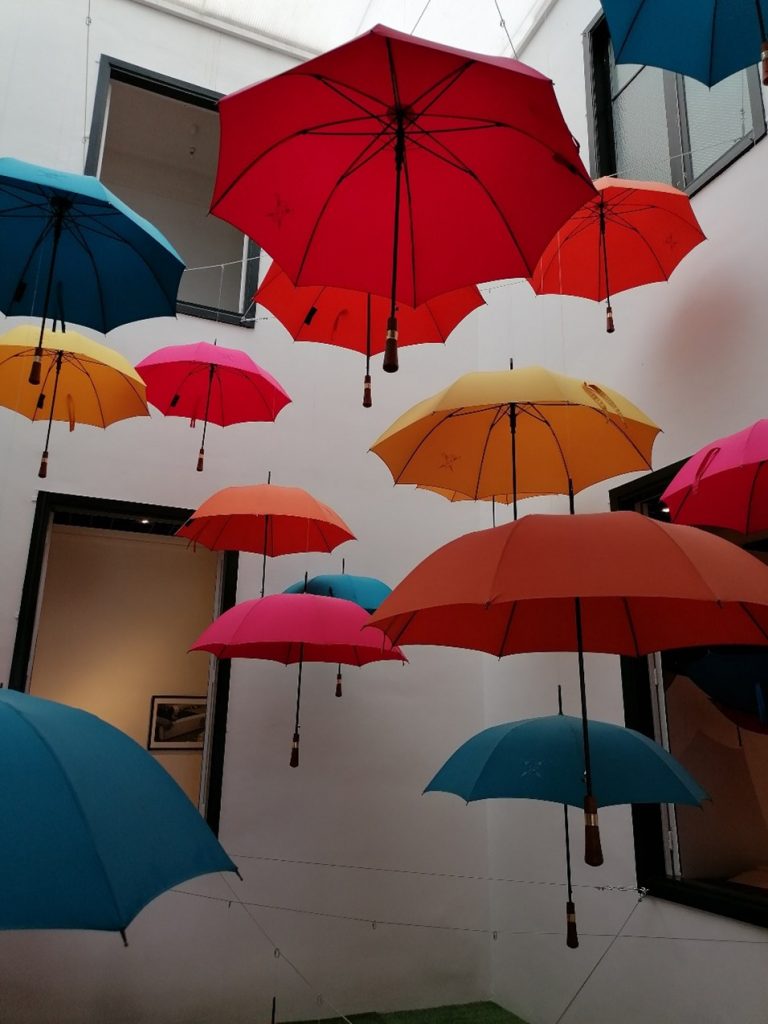
ERASMUS +-Projekt zu unserer Partnerstadt in Frankreich
Im Mai 2025 hat zum dritten Mal der Schüleraustausch mit unserer Partnerschule in Frankreich stattgefunden, diesmal unter der Leitung von Frau Hüllen und Herrn Cherkaoui. Je 14 Schülerinnen und Schüler aus Cherbourg und Bremerhaven haben sich gegenseitig besucht, eine Woche in ihrer Gastfamilie gelebt, ihre Fremdsprachkenntnisse vertieft und viel Spaß gehabt. Natürlich haben wir auch gemeinsam an unseren Projekten gearbeitet, die durch ERASMUS+ gefördert wurden.
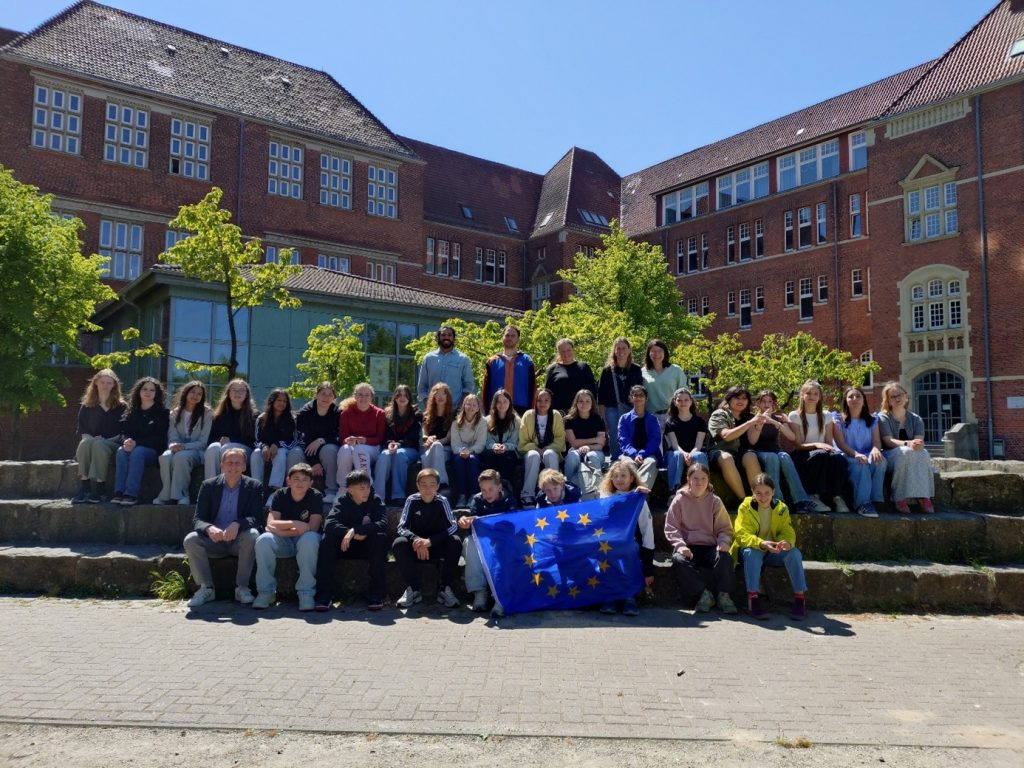
Der Besuch in Bremerhaven (12.-17.5.2025) zum Thema „nachhaltige Entwicklung“ hat uns z.B. ins Klimahaus, ins Alfred-Wegener-Institut und ins Nationalparkhaus Wattenmeer geführt.
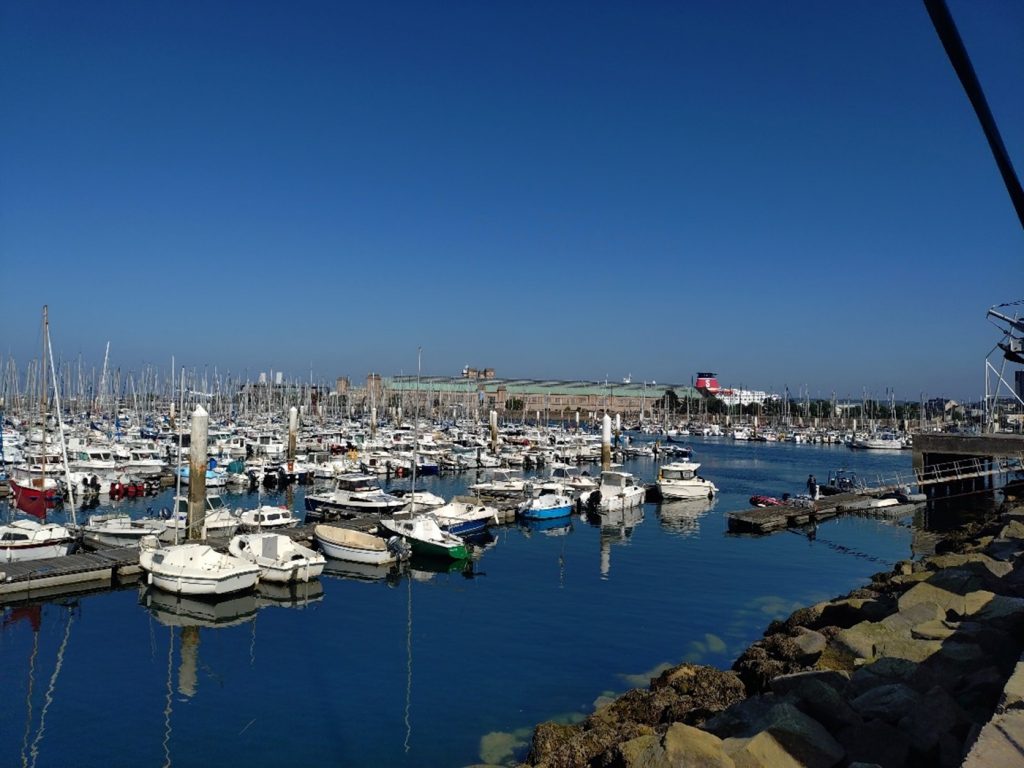
Unsere Fahrt nach Frankreich (17.-24.5.2025) zum Projektthema „Berufsfeld Tourismus“ hatte das Ziel, eine Ausstellung für unsere Mitschüler am Lloyd Gymnasium zu gestalten. Dazu haben wir uns nach Farben in Teams aufgeteilt und viele Fotos gemacht, z.B. in der Innenstadt von Cherbourg, an der Küste, im Tiefseemuseum La Cité de la Mer und in der Regenschirm-Manufaktur Le Parapluie.
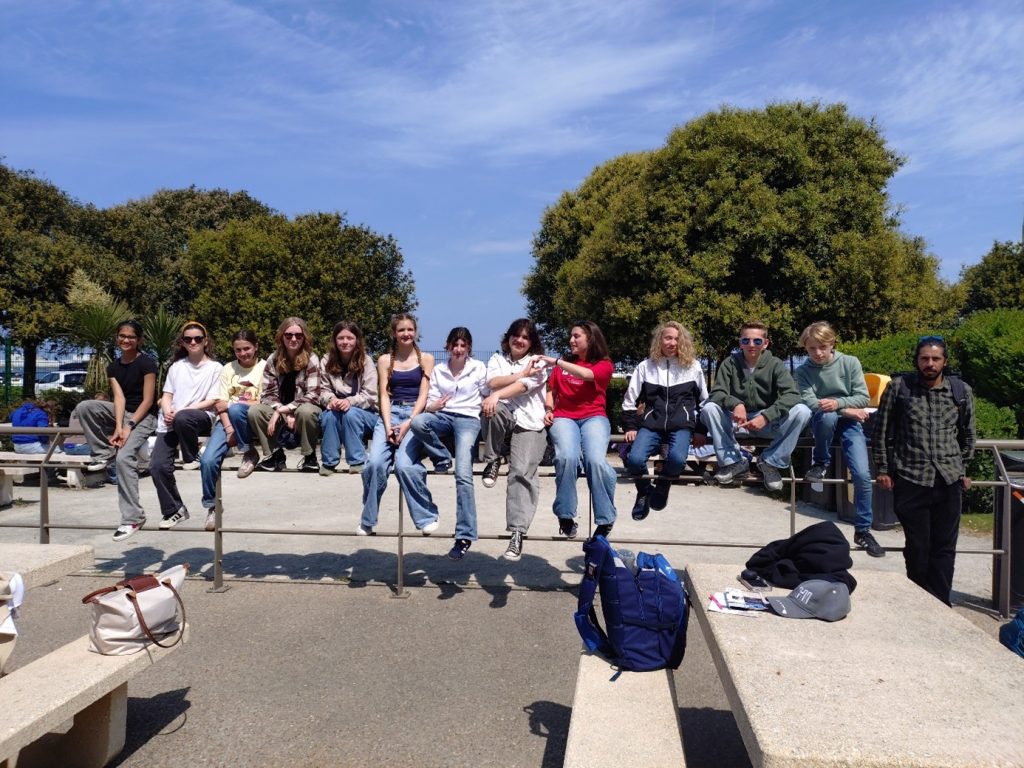
Kurz vor den Sommerferien haben wir dann in der Schule unsere Fotos ausgestellt – nach Farben sortiert unter den bunten Regenschirmen, die Frau Tobias extra für uns hergestellt hatte. Merci beaucoup, Madame Tobias! Unsere Ergebnisse sind unter den folgenden Links genauer zu sehen: black, blue, brown, green, red, white, yellow.
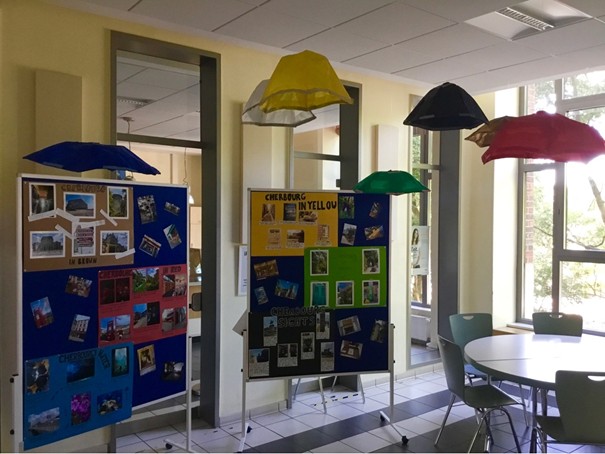
Schülerinnen und Schüler der 7a, 7b, 7d, 8a, 8d mit Frau Hüllen und Herrn Cherkaoui
PS: Auf dem Rückweg waren wir auch in Paris.
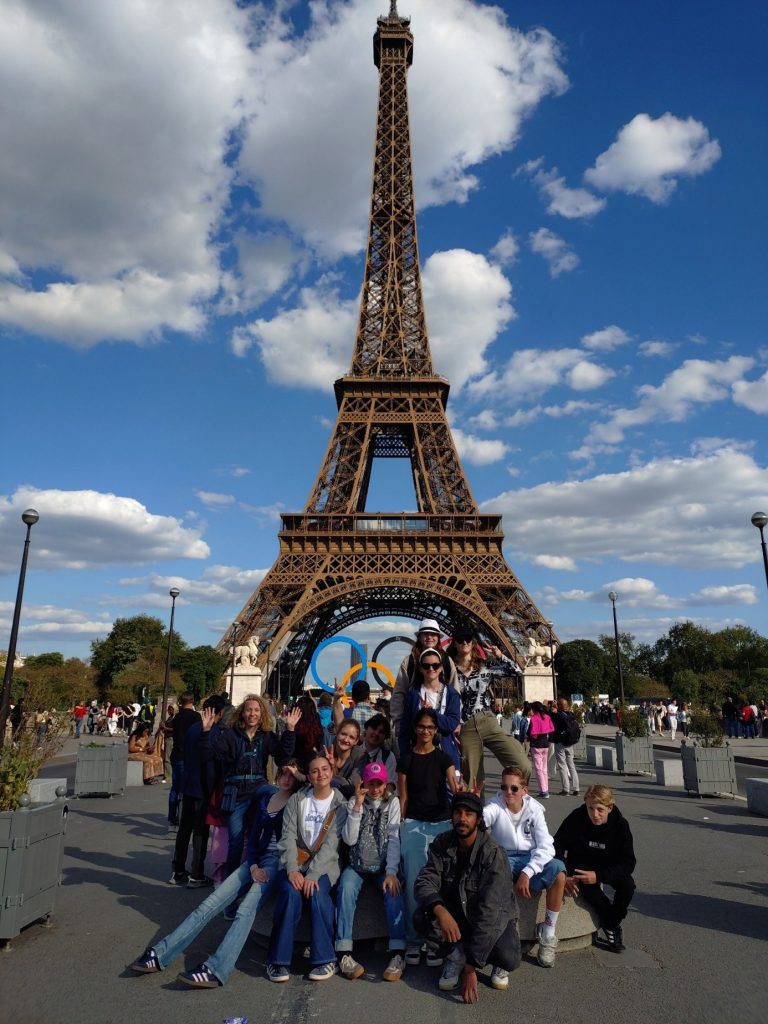
Am 13.5.2025 fand im Rahmen der Europawochen ein europäisches Sprachencafé am Lloyd Gymnasium statt. Von 12:30 Uhr bis 14:30 Uhr begrüßten einige Lehrkräfte und Schülerinnen und Schüler aus den Klassen 5d, 8d und E3 ihre Mitschüler*innen in verschiedenen europäischen Sprachen und stellten ihr Heimatland vor.




Die besuchenden Klassen konnten auf Polnisch, Slowakisch, Englisch, Spanisch, Ukrainisch, Kroatisch, Griechisch und Russisch ins Gespräch kommen, ein paar Vokabeln lernen und sich diese auch als Handout zur Erinnerung oder für den nächsten Urlaub mitnehmen.

Manche Schüler*innen hatten sogar landestypische Snacks und Gebäck vorbereitet, an denen sich die Besucher*innen erfreuen konnten.



Darüber hinaus gab es auch Wettbewerbsbeiträge aus verschiedenen europäischen Wettbewerben zu bestaunen. Die 5d stellte ihre Mathecomics vor, die im Rahmen der Young Mathematical Story Authors Competition entstanden sind. Die 8d präsentierte einen preisgekrönten Beitrag des Bundeswettbewerbs Fremdsprachen und aus dem Europäischen Wettbewerb waren Beiträge der 6a und Q1 zu bestaunen.



Wir schätzen sehr, dass das Sprachencafé so gut besucht wurde und freuen uns darauf, im nächsten Jahr noch weitere Sprachen zu präsentieren!
L. Bliek
Auch musikalisch präsentiert sich das Lloyd einmal mehr als Europaschule: Nun war es im Zeitalter der Perücken und Feudalherren mit der Idee eines vereinten Europas natürlich noch nicht so weit her. Erst die Wiederentdeckung des „Te Deum“ in den 1950ern und der Einsatz als Erkennungsmelodie in den Europäischen Rundfunkanstalten 1954 machte die gegen Ende des 17. Jahrhunderts entstandene Komposition von Marc-Antoine Carpentier zum heute jedermann/frau bekannten Thema der Eurovision.
Schüler:innen der Q-Phase machten sich im Zuge eines Durchgangs durch die Musikgeschichte im Musikunterricht bei Herrn Wiese an die Aufgabe, das berühmte barocke Thema, wie für die Zeit üblich, mit einem polyphonen, mehrstimmigen Satz zu unterlegen und das – wohlgemerkt: als Eigenkomposition!
Heraus kam einiges, was sich sehen – besser: hören – lassen kann. Hier nun zwei exemplarisch ausgewählte „Werke“:
Angelina Schulz und Jaroslaw Sotow (Q2)
Im Rahmen des Deutschland Plus Programms war es wieder soweit: Auch dieses Jahr durften wir eine ausländische Gruppe an unserer Schule begrüßen und dieses Mal hatten die Gäste, 12 Schülerinnen und Schüler sowie 2 Lehrerinnen, eine sehr weite Reise aus dem südostasiatischen Vietnam auf sich genommen.
Die Gruppe hat in der Zeit vom 14.08. – 29.08.2024 viel von Bremerhaven kennengelernt und dabei auch die eigenen Deutschkenntnisse im Deutschunterricht erweitert. So waren sie u.a. auf Exkursion im Auswandererhaus, dem Alfred-Wegener-Institut, in der Hochschule, im Wattenmeer oder auch auf einer Stadtführung in Bremen und zumeist zeigte sich das Wetter zum Glück von seiner besten Seite. Als kulinarisches Highlight durfte für die Gäste natürlich die Bratwurst oder das Schnitzel bei den maritimen Tagen nicht fehlen.

Für die teilnehmenden deutschen Schülerinnen und Schüler aus dem 9. Jahrgang sowie der Oberstufe, welche die Gäste in dieser Zeit in ihren Familien aufnahmen, war es eine interessante Erfahrung, den Vietnamesen die eigene Heimat ein Stück näher zu bringen. Dabei haben sie und ihre Familien sich stets um das Wohlbefinden der Gäste gekümmert und bei einigen ist sogar eine Freundschaft entstanden. Ohne die Gastfamilien, die zum Teil auch Kolleginnen des Lloyd Gymnasiums bildeten, wäre das Programm nicht zu Stande gekommen und deswegen gebührt ihnen ein großer Dank!
Einen schönen Abschluss bildete die Abschiedsveranstaltung am vorletzten Abend, bei dem die Gäste vietnamesische Gerichte, wie Frühlings- und Sommerrollen sowie Bratreis, zubereiteten und damit die Gastfamilien verköstigten. Die Lehrerinnen Ngan und Thu planen bereits in der Zukunft nach Bremerhaven zurückzukehren, denn ihnen hat die Zeit in Bremerhaven besonders gut gefallen. Auch die Schulleitung war am Ende begeistert von den Fortschritten, welche die vietnamesischen Schülerinnen und Schüler in ihren Deutschkenntnissen gemacht haben.
Am Morgen des 29. August fuhr die Gruppe noch für ein paar Tage nach Bonn, bevor sie dann am 02.09. von Berlin aus abflog und am 03.09. wieder am Heimatflughafen in Hanoi ankam.
Wir wünschen den Gästen viele bleibende Eindrücke und hoffen auf ein baldiges Wiedersehen!
ERN

Dieses Jahr haben wir gemeinsam an einem 5-tägigen Erasmus-Projekt mit unserer Partnerstadt Cherbourg in Frankreich teilgenommen. Dabei handelte es sich um einen Austausch mit den Schülerinnen und Schüler der Collège Bucaille-Charcot.
Die Hafenstadt Cherbourg liegt an der Küste im Norden von Frankreich, in der Region Normandie ca. 15 Stunden von Bremerhaven entfernt. Obwohl es viele Unterschiede zwischen unseren Kulturen gibt, konnten wir wiederum auch Gemeinsamkeiten zwischen den beiden Städten finden, wie bspw. die Erhaltung von alten Gebäuden, die Errichtung von historischen Monumenten, aber auch das regnerische Wetter.
In Bremerhaven arbeiteten wir zusammen zum Thema ,,Sustainable development„. Wir konnten unseren Austauschpartner*innen ein Einblick in die vielfältigen Sehenswürdigkeiten Bremerhavens geben, die unsere Kenntnisse über die Umwelt erweiterten und zu einem Fortschritt in unserem Projekt beitrugen. Während ihrem Aufenthalt lernten wir viel über uns gegenseitig, da sie die Chance hatten, in den deutschen Alltag einzutauchen, so dass wir uns schon auf die 1 Monat spätere Hinfahrt noch mehr freuten.

Diese verlief mit einem eintägigen Stopp in der Hauptstadt Paris in dem Viertel Montmartre. Der gehört zu den einen Sehenswürdigkeiten die wir besichtigt haben. Somit konnten wir auch während unserer Unterkunft die berühmte Sacré-Coeur besuchen. Nach der Anreise in Cherbourg waren wir erfreut unsere Austauschpartner*innen wieder zusehen und unsere Gastfamilien kennenzulernen.
Wir fühlten uns herzlich willkommen und konnten uns in diesem neuen Umfeld einfach integrieren. In Cherbourg haben wir uns mit dem Thema ,,Work experience in France“ auseinandergesetzt. Während unseres Austausches informierten wir uns über die verschiedenen Praktikumsmöglichkeiten in Geschäften, sowie bei unseren Austauschpartner*innen, zu dem Zweck eine Broschüre über die Praktika in Cherbourg, die für ganz Bremerhavener Schüler*innen zugänglich wird. Auch als wir verschiedene Museen, wie z.B. Le Parapluie de Cherbourg oder La Cité de la Mer besichtigten haben wir uns weiter zu unserem Thema informiert.
Im Rückblick können wir sagen, dass ein Schüleraustausch nach Cherbourg auf jeden Fall empfehlenswert ist und für uns für immer als ein unvergessliches Erlebnis als Erinnerung bleibt. Es öffnete uns eine Tür von Möglichkeiten, z.B. neue Kontakte außerhalb Deutschlands zu knüpfen, Sprachbarrieren im Englischen und Französischen zu überwinden und unsere Selbstständigkeit im Ausland in Probe zu stellen. Wir sind dabei zuversichtlich, dass unsere Freundschaften in Cherbourg auch in der Zukunft erhalten bleiben und würden jedem weiterempfehlen an so einem Austausch teilzunehmen.
Elifnaz T. und Katharina K. aus der (ehem.) 9b
Tag 1 (3.6.2024):
Heute haben wir uns um 6:00 Uhr morgens am Hauptbahnhof Bremerhaven getroffen. Wir sind erstmal mit dem Regional-Express nach Bremen gefahren – das ging echt fix! Mit der Bremer Straßenbahn 6 sind wir dann zum Bremer Flughafen gefahren. Zuerst haben wir uns eingecheckt. Dann mussten wir noch etwas warten… Um 9:50 Uhr sind wir Richtung Zürich davongeflogen. 🛫
Nach ungefähr einer Stunde sind wir wohl in der Schweiz (Zürich) angekommen. Der nächste Flug nach Valencia startete um 11:40 Uhr. Im Flieger gab es super leckere schweizerische Schokolade. Die letzten 20 Minuten hatten viele starken Luftdruck auf den Ohren, da wir lange in Turbulenzen waren. Mit der Bahn ging es dann nach Xátiva. Einige Eltern und Lehrer haben uns von Xátiva nach Chella mit dem Auto gefahren. Dort haben uns unsere Austauschfreunde mit einem Willkommensschild herzlich empfangen. Wir haben unsere tolle, moderne Unterkunft angesehen und die Zimmer direkt eingeteilt. Alle haben zusammen Schweinchen in der Mitte gespielt und es hat sehr viel Spaß gemacht.

Es gab ein gemeinsames Abendessen der Klassen 6a und 6d. Die meisten haben einen Chrunchy Burger gegessen. Also wenn man mal in Spanien ist, dann sollte man sich einen leckeren Chrunchy Burger holen.
Zum Schluss sind wir noch für die nächsten Tage einkaufen gegangen.
Um 22:00 Uhr wurden alle Handys eingesammelt und es herrschte Bettruhe.
Gute Nacht 💤😴🌙 – von Lotta, Clarissa und Hannah
Tag 2 (4.6.2024):
Heute sind wir (Jungs ,nur Paul und Jonathan 😂) um 7:00 morgens aufgestanden. Haben dann aber trotzdem versucht bis um 7:30 zu schlafen. Dann haben wir (alle) gefrühstückt. Nach dem Frühstück sind wir dann zur Schule gelaufen (sind nur 30m), dann haben wir unsere Freunde aus Spanien getroffen. Die Freunde haben wir schonmal kennengelernt, sie waren schonmal bei uns zum Austausch in Bremerhaven. Nach der Ankunft (in der Schule) haben wir ein Spiel gespielt es heißt: find someone who. In dem Spiel kriegt man einen Zettel, wo in kleinen Kästchen Fragen stehen, auf jede Frage sollte man 3 Namen (min.) schreiben, wenn sie zu den Fragen ja sagen.


Nachdem wir unsere Handys sowas von bekommen haben 😄 sind wir auf eine Schnitzeljagd gegangen und haben ein dabei ein Interview mit einer Frau geführt, die seeeehr lecker riechende Hühnchen gebraten hat. Nach diesem langen Interview sind wir auf ein halben Berg (Anm. Red.: Anhöhe) geklettert (Anm. Red.: gegangen), um ein ultra schönen Wasserfall zu betrachten und mehrere Fotos haben wir da auch gemacht. Danach sind wir zu einem Café gegangen, wo fast alle😅 ein leckeren Cupcake gegessen haben (Anm. Red.: typisch valenzianische Küchlein aus Kürbis und Mandeln), in der Nähe war auch eine Kirche, die (gefühlt) fast jede 5 Minuten geklingelt hat. Wir haben dann einen Brunnen gesehen, wo man auch trinken kann 🤩🥳 und noch ein Foto gemacht. Dann ging es zurück zur Schule👽. Das Essen war relativ lecker, wir haben vergessen, was es gab (Anm. Red.: Paella). Nach dem Essen sind wir zurück zu unserem Hotel (Anm. Red.: unserer Unterkunft) gegangen. Dann hatten wir eine kurze Pause und dann sind wir Eis essen gegangen, alle haben Strangella (Straciatella ) genommen (Anm. Red.: Stimmt nicht). Dann sind wir bei Consum (ein Supermarkt ) 🤨 einkaufen gegangen.




Das wars dann auch für heute. Good night. 😪
(Anm. Red.: Die Lehrer wurden sogar vom Bürgermeister von Chella höchstpersönlich in der Stadt willkommen geheißen. Außerdem gab es in der Schule eine ausführliche Führung, bei der wir nicht nur einen tollen Tanz von 1.-Klässler*n gesehen haben, sondern auch kleine Küken streicheln durften, die am Tag zuvor geschlüpft sind. – Wie man das nur vergessen kann? 😉)


Tag 3 (5.6.2024):
Heute Morgen sind wir ( die Mädels😉) früh aufgestanden (6 Uhr). Danach haben wir gefrühstückt, es gab Müsli und Cornflakes. Nach dem Frühstück haben wir uns mit den Spaniern in einem kleinem Park neben einem Supermarkt getroffen und sind danach in einen Bus gestiegen. Das Ziel war Xátiva. Nach einer 45-minütigen Fahrt sind wir dann in Xátiva angekommen.Dann ging es los, wir haben als erstes eine kurze Stadtführung bekommen, dann ging es immer steiler hinauf, denn wir sind auf einem Berg hinauf gewandert, um die Burg zu sehen (Castell de Xátiva). Es war anstrengend dort hoch zu kommen, aber es hat sich gelohnt, denn als wir oben angekommen sind, war die Aussicht sehr schön. Dann durften wir endlich eine Pause machen. Die meisten haben sich auch dann ein Eis geholt. Davor wurden wir noch von den Spaniern mit Wurst beworfen 😂. Dann ging es wieder den Berg hinunter. Danach sind wir Pizza essen gegangen (bei Telepizza). Als wir dann mit dem Essen fertig waren, sind wir wieder mit dem Bus nach Chella gefahren, um uns in der Unterkunft fürs Schwimmen fertig zu machen. Als uns dann die Spanier mit den Autos abgeholt haben, sind wir an den Strand gefahren. Das Wasser war sehr kalt, aber es hat trotzdem sehr viel Spaß gemacht. Der Ort war sehr schön, und wir haben sogar einen kleinen Wasserfall entdeckt. Nachdem wurden wir wieder von den Spaniern mitgenommen und zum Einkaufen gefahren, um Trinken zu kaufen. Als wir zurück gekommen sind, hat uns ein leckeres Abendessen von Frau Nies erwartet, es gab Pasta. Nach dem Abendessen haben wir uns alle angefangen bettfertig zu machen, und den Bericht zu schreiben. Gute Nacht, wir sehen uns Morgen 💤. – von Elenya und Maja



Tag 4 (6.6.2024):
Heute sind wir um 6 Uhr 30 aufgestanden. Als erstes haben wir uns fertig gemacht , mussten unsere Koffer packen, und dann sind wir frühstücken gegangen. Heute gab es Müsli, Cornflakes und Toastbrot. Um 9 Uhr war ein Treffen an der Schule mit den Spaniern. Direkt mussten wir unsere Koffer in den Bus packen und einsteigen, denn heute ging es nach Valencia. Nachdem wir zum Museum gelaufen sind, haben wir unsere Koffer in einem Abstellraum aufbewahrt. Wir mussten in 3er Gruppen laufen.


Nachdem wir das Museum erkundigt haben, gingen wir ins Aquarium. Das Aquarium war so toll und schön. Am besten fanden wir am Aquarium die Delfin Show. Nach dem ganzen Programm mussten wir zu unsere neuen Unterkunft gehen. Dafür mussten wir mit dem Bus fahren und dann mit der Bahn. Anschließenden wurden wir zur Villa gefahren und haben Volleyball gespielt, zum Schluss durften wir in den Pool gehen, das war mega cool, danach war Bettruhe und wir mussten unsere Handys abgeben. Somit war der Tag zu Ende.
Guten Nacht 😴🌚💤🌌 – Belsan
Tag 5 (07.06.24):
Heute morgen sind wir um 8:00 Uhr geweckt worden und waren viel ausgeschlafener als sonst. Wir hatten eine Stunde Zeit, um uns alle fertig zu machen. Um 9:00 Uhr gab es dann ein sehr leckeres Frühstück (Croissants und Kakao). Nach dem Essen fuhr uns der Fahrer in zwei Gruppen zum Flughafen. Der Flug von Valencia nach Frankfurt war für uns alle sehr gut. Die meisten haben geschlafen. Als wir ausgestiegen sind, mussten wir direkt zum anderen Flugzeug. Doch dann hatten wir ein richtig großes Problem. Der Flug wurde GESTRICHEN 😡 . Wir waren erst sehr planlos, doch dann hat Herr Frischholz sich informiert und wir wussten danach schon viel mehr. Danach haben wir unsere Koffer abgeholt. Hannahs Rolle vom Koffer ist abgefallen und Frau Nies‘ Koffer brauchte etwas länger als die anderen zu kommen. In der Zeit, wo Frau Nies auf ihren Koffer gewartet , hat, waren alle anderen bei MC Donalds und KFC. Als wir super satt waren, haben wir uns mit Frau Nies an der Kofferabholung getroffen und sind zusammen zum Bahnhof gelaufen. Nun müssen wir sehr lange mit dem Zug fahren, obwohl wir schon längst wieder in Bremerhaven sein könnten. Am Bremer Hbf werden wir dann von ein paar Eltern in Gruppen abgeholt. Doch jetzt sind wir immer noch im Zug. Der Spanien Austausch war sehr toll. Wir alle hatten sehr viel Spaß. Wir hoffen, dass wir das irgendwann wiederholen.
Gute Nacht 🌙💤😴 – Hannah